#i’ve read a single book published this year all year long
Explore tagged Tumblr posts
Text
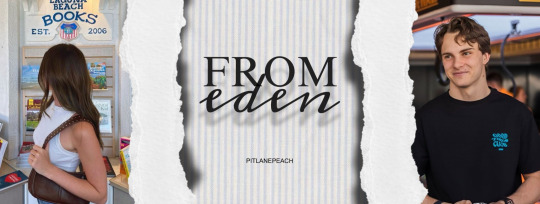
From Eden | Chapter Four (4/8)
Oscar Piastri x Francesca Gold (OFC)
Summary — Francesca Gold is an introvert with a quiet life and a Youtube channel where she talks about books, drinks too much tea, and rarely ever shows her face. She prefers it that way - tucked into her London flat with her cat, Henry, and safely hidden behind a screen.
Oscar Piastri is a Formula 1 driver. Fast-paced, high-stakes, always on the move. He hasn't read a book in years, but he's watched every single one of Francesca's videos. Just for the sound of her voice.
Following her on Instagram was a moment of weakness. He didn't think she'd notice.
She did.
Chapter Warnings — Mentions of agoraphobia + severe social anxiety. A glimpse into a therapy session. Mentions of racing accidents. A tiny bit of angst, and then lots of fluffiness.
Notes — Yes. It happens. It finally happens. Our babies MEET. Also: I’m spoiling you all with these updates, but I’m writing like a mad woman atm. I wrote 3/4 of this chapter after work today.
Oscar’s face filled her screen, his hair mussed, white t-shirt hanging loose around his neck. The hotel lamp behind him cast a soft golden glow, and his voice was low and tired when he said, “Hey.”
Francesca smiled without meaning to, her laptop perched on her thighs and a mug balanced precariously on the arm of the sofa. “Hey. You sound half-asleep.”
He shrugged one shoulder, a lazy smile tugging at his mouth. “I’m not. Just tired. Long day.”
She hummed, shifting her laptop slightly. “You didn’t have to call me tonight. I know you’ve got another early start tomorrow.”
“I wanted to,” he said simply, like it wasn’t even a question.
They fell into a lull, not uncomfortable. Oscar reached for something offscreen — probably a bottle of water — while Francesca scrolled back through the rough notes she’d been making for her book. Her screen glowed faintly, a scattered mess of plot threads, character traits, and one lonely bullet point that just said: Let them kiss, eventually.
“What are you working on?” Oscar asked, his voice soft, easy. His thumb rested against his cheek as he watched her like she was the most interesting thing on screen—not whatever was playing on Netflix in the background.
Francesca laughed quietly, the sound half-nervous, half-flattered. Her neck flushed warm. “The outline. For the book.”
“Ah, yes. The very-big-deal-but-trying-to-play-it-cool publisher thing.” His grin was lopsided and teasing, but his eyes were full of something else — something that made her stomach flutter. She’d told him about it the second Katie had left, unable to keep it to herself. That had been two weeks ago.
“Have you figured out the, uh, plot yet?” he asked, genuine curiosity softening the teasing.
“Sort of,” she said, chewing the inside of her cheek. “It’s messy right now. But I keep thinking about how to write two people who don’t make sense on paper. Like — different lives, different worlds. But they find this… perfect little space where things make sense. With each other.”
Oscar’s eyes held hers for a moment, steady. “That sounds good. Familiar.”
She blushed, immediately looked back at her screen. “It’s just a first draft. I probably won’t like it by next week.”
He grinned. “Can I be the first to read it?”
“You don’t even read.” She shot back.
“I’d read anything if you were the one to write it.”
Francesca tried to hide the way her breath caught, but it was pointless — the screen was too intimate. Too real.
Oscar must have noticed. Instead of pushing, he leaned back against the headboard, stretching out those long limbs. “You’ve got your book. I’ve got my races. We’re both booked and busy for the next few months, huh?”
“Yeah,” she said quietly. “But… it feels a little less overwhelming when I’m talking to you.”
His brows lifted — like he hadn’t expected her to say that out loud.
She bit her lip. “Too much?” She was always second-guessing what she should and shouldn’t say to him. This whole getting to know each other while also maybe-flirting thing was still very new to her.
“No,” he said, his voice low, warm, and firmer than usual. “Not even a little.”
The screen flickered slightly as he shifted beneath the covers, yawning into his shoulder. “You keep working. I’m just gonna close my eyes and listen to you type. Don’t mind me.”
Utterly ridiculous.
She watched him through the screen, his face half-shadowed in the low hotel light, eyes still closed. For a minute, she just listened to the sound of his breathing, even and slow.
Then, before she could second-guess herself, she asked — quietly, like the question was delicate in her mouth, “If we’re both this busy… how are we going to make it work? The — uh — us meeting thing…”
Oscar’s eyes opened, slow and steady. He looked right at her — really looked. All the sleepiness disappeared in an instant.
“When you’re ready,” he said, voice steady and certain. “When you say the word — I’ll make it happen, Francesca.”
Francesca swallowed. “Even if it’s… months from now?”
“Yeah,” he said without hesitation. “Next week, six months. Next year.” He stressed the words. “When you’re ready, I’ll find the time. I’ll show up. I’ll be there.”
She blinked, unsure what to say, a warmth blooming somewhere deep in her chest. No one had ever spoken to her like that — like effort was the bare minimum, like she was worth rearranging a life for.
He smiled then, softer now. “You’re not something I’m just squeezing in whenever I have a spare five minutes, Francesca.”
She lowered her gaze to her laptop screen, biting back a ridiculous smile. “You really know how to mess with a girl’s focus, Piastri.”
His laugh was quiet, happy. “Good.”
—
Francesca sat cross-legged on her bed, laptop propped up on a stack of pillows. Sunlight filtered through the half-open curtains, painting soft, warm streaks across her duvet. Dr. Kapoor’s face filled the screen, serene and steady as always.
“You mentioned last time that you were ready to try something new,” she said gently, “something uncomfortable.”
Francesca nodded, fingers toying with the edge of the pillow she was hugging to her stomach. “Yeah,” she said. “I went for this, uh, stupid little walk. Literally just to the postbox at the end of my street and then straight back.”
Dr. Kapoor smiled. “A walk isn’t stupid.”
“No,” Francesca agreed with a small huff, “but it was hard. That’s what’s stupid.” She paused, then added, “I was out of the flat for ten minutes, maybe. No headphones. I looked at people.” Her voice dropped slightly, like saying it too loudly might unravel the fragile progress she’d made. “I didn’t turn around early. I wasn’t sick in my neighbours bush.”
Dr. Kapoor’s expression softened. “That’s a big deal, Francesca. How did you feel afterwards, once you got home?”
“Proud,” she admitted, wringing her hands together. “Also like I might never do it again.”
She laughed lightly. “You’ll do it again. Pride is a very strong motivator.”
Francesca hummed. “I journaled after. Like we talked about.”
“And what did you write?”
“That I was scared,” she said, looking down. “And I didn’t die. And I didn’t need anyone to come get me. I did it alone. It felt… weird. Good weird. Kind of.”
There was a long pause as Dr. Kapoor took that in. “That’s a great self-reflection. Honest.”
Francesca stared at a little chip in her nail polish. “I have spent years waiting for things to just magically get easier,” she said eventually. “Like one day, I’d wake up and it just wouldn’t be hard anymore. But that’s not going to happen, is it? Not even when I’m taking medication.”
“No,” Dr. Kapoor said, not unkindly. “It won’t. Not like that.”
The lump in Francesca’s throat tightened, but she nodded. She didn’t cry. That was something.
“Do you want to try something bigger this week?” Dr. Kapoor asked.
Francesca’s eyes flicked to the corner of the screen, to her own pale reflection. “Define bigger.”
“How would you feel about a short café visit? Ten minutes. Order something. Sit alone.”
Francesca blanched. “Oh god.”
“Trying is the goal,” Dr. Kapoor said warmly. “Not perfection. Not comfort. Just the attempt. You can always walk to the cafe and then go straight home. You could get a to-go drink. Or you could sit inside and just let yourself take up the space that you’re entitled to.”
Francesca gave a little shrug. “Would it be cheating if I wore my headphones and took a book with me?”
“Not cheating,” her therapist assured her. “That’s a very common coping mechanism. Just don’t let yourself disappear into it. Try to take notice of the world around you, too.”
She managed a smile. It was small, but real. “Okay. Ten minutes. Book optional.”
Dr. Kapoor’s voice gentled again. “Is there anything else that you’d like to talk about?”
Francesca hesitated. Her thumb ran over the stitching on the pillow in slow, nervous circles. “I said yes to doing something,” she said finally. “To… meet someone new. Not soon, but eventually. I want to be braver by then.”
There was a quiet moment between them.
“Why?” Dr. Kapoor asked gently. “What is making you think that you need to be braver than you already are?”
Francesca blinked, her breath leaving her in a soft exhale. “I don’t know.”
“We’ve already talked about the book deal.” Dr. Kapoor recalled. “Taking on a project like that has taken a lot of bravery. Going for your walk? That took a lot of bravery too.” She pointed out. “I think, perhaps, you’re underestimating how much better you’re doing recently, Francesca. Six months ago, you couldn’t walk out of your front-door.”
Francesca stared at a small smudge on the screen. “I don’t notice it, when I’m doing well.”
“Well,” Dr. Kapoor said, with an encouraging nod. “I’ve noticed it. I’m telling you. You are doing well.”
Francesca smiled.
—
Francesca was curled up on her sofa, half-watching the podium interviews and half-scrolling through messages when Oscar’s name lit up her phone screen.
She found that she was smiling before she even answered.
He looked exhausted, glowing with sweat — post-race adrenaline still clinging to him. His cap was backwards, damp curls sticking out at the edges. “Hey,” he said, eyes bright. “Did you see that overtake?”
Francesca laughed. “Crofty lost his mind, Osc.” She stared at him, feeling ridiculously fond. “Yeah. I saw.”
Oscar beamed. “Felt pretty good. Not gonna lie.”
“You looked like you were flying out there,” she told him, her voice light. “Literally, at some points. I don’t understand how you can go around corners so fast and not just, like… tip over or something.”
Oscar huffed a quiet laugh. “Nah, only amateurs tip their cars on the apex.”
Francesca flushed. “Oh, shut up.”
There was a beat of silence, then his expression softened, dimples barely visible beneath the shadow of his cap. “Thanks for watching.”
She looked down, fingers tightening around her phone. “You don’t have to thank me. I like watching you.” She hesitated, then added with a small smile, “I might need to send a scathing email to Sky Sports, though. They don’t show you nearly enough on the main broadcast. I can’t deal with the onboard — makes me nauseous.”
He chuckled, low and warm, the sound curling around her ribs. “Yeah, I’d rather you didn’t ride onboard with me, honestly. If something happened—” He broke off suddenly, jaw tightening. His eyes flicked away like he’d said too much.
The air between them shifted.
Her stomach dropped. It was too easy to forget what he did. To pretend, for her own comfort, that it was safe. Controlled. Not dangerous.
She sucked in a slow breath, already feeling the panic creeping in at the edges. “I’ll call you later,” she said quickly, before he could say anything else. Before she could spiral.
Then she ended the call—like a coward.
—
The paddock buzzed with celebration after Ferrari’s victory, but Oscar barely noticed. He moved quickly, head down, nodding absently at a few crew members as he passed. Lando’s driver’s room door was half-shut, muffled music playing from inside.
Oscar knocked once, then let himself in.
Lando looked up from where he was sprawled on the small couch, a half-finished protein shake in hand. “Alright, mate,” he said. “Don’t you have some post-race debrief to be at?”
Oscar shut the door behind him. “I need to talk to you.”
Lando sat up, brows lifting. “Francesca?”
Oscar nodded once. He didn’t sit — just crossed the room and leaned back against the wall, arms crossed. “She hung up on me. We were talking after the race. I said something—about my onboard camera, how I didn’t want her watching it, just in case something ever happened. She went quiet. Said goodbye. Ended the call.”
Lando frowned. “You think you freaked her out?”
“I know I did.” Oscar dragged a hand through his hair. “It’s so easy to forget how not-normal this sport is to normal people.”
Lando set his drink down. “Right. I get that. She’ll probably get used to it though, yeah? I’ve had girlfriends freak out about it too, but once they realise how rare the big crashes are—”
“This isn’t like that,” Oscar cut in, quieter now. “She’s not just someone I met last weekend.” He hesitated, then added, “She’s got her stuff. Anxiety — a lot of it. She doesn’t really leave her flat much. But she’s trying. She’s been pushing herself and… I think I went too far with it.”
Lando was quiet, thoughtful for once. “Okay. Give her space. Let her process. But don’t vanish on her. Send her a message. Let her know you’re still here. Let her decide when to come back in.”
Oscar let his head fall back against the wall with a dull thunk. “It’d be so much easier if she liked F1.”
“She doesn’t need to like F1,” Lando said with a small, knowing smirk. “She likes you.”
Oscar exhaled through his nose, some of the tension leaving his shoulders. He turned toward the door, hand on the handle, then paused. “You ever think this job makes it impossible to have a normal relationship?”
“All the time,” Lando said, not even pretending otherwise. “But look at Max. Lewis. Charles. They’ve all figured it out. Doesn’t mean it’s easy. Just means it’s possible.”
Oscar nodded once, not quite smiling, but something close. “Yeah. Alright.”
Then he left — already reaching for his phone.
—
iMessage — Oscar & Francesca
Oscar:
I’m sorry if I scared you. I didn’t even mean to say it. I’m so used to the people I care about being used to this stuff. I didn’t think. I’m sorry.
Francesca:
pls don’t say sorry. im the one who should be sorry. i shouldn’t have hung up. i just felt myself getting worked up and that’s embarrassing, lol. i felt silly for it
Oscar:
You’re not silly. I promise.
Francesca:
um. quick question. when is your next bit of time off?
Oscar:
?
Francesca:
i want you to come to london, osc
i need this to be real.
Oscar:
Wednesday?
Francesca:
which wednesday?
Oscar:
As in three days from now
That Wednesday
Francesca:
Oscar.
Oscar:
You said the words. No taking them back now.
Send me your address. Don’t overthink this.
I’ll call you in an hour, yeah? Just got a few more things to do before going back to the hotel
Francesca:
okay <3
—
iMessage — Francesca & Katie
Francesca: SOS actual sos mayday mayday girl down
Katie: …what happened did henry throw up on your laptop again
Francesca: OSCAR IS COMING TO LONDON TO MY FLAT ON WEDNESDAY AS IN. WEDNESDAY. IN THREE (3) DAYS. TO MY HOME. WHERE I LIVE.
Katie: OH MY GOD OH MY GOD I AM CALMLY SCREAMING
Francesca: i said the words like an idiot “i want you to come to london, osc” WHO EVEN AM I
Katie: i’m so proud of you
Francesca: i just stood there staring at my mirror for 11 minutes trying to decide if i should buy new sheets WHAT IF HE THINKS MY PILLOWS ARE WEIRD or what if henry bites him or what if i bite him
Katie: … fran.
Francesca: not in like a weird way i just i’m spiraling
Katie: you’re going to be FINE you like him he likes you he’s coming because he wants to not because your pillowcases are perfectly crisp
Francesca: but they’re not though they’re old and faded and they have little stars on them
Katie: which is exactly the kind of thing a soft boy in love would find charming now breathe make your outline order yourself some new teabags clean the bathroom and maybe light a candle
Francesca: i am lighting twelve candles.
Katie: do not set your flat on fire before wednesday. he’s gonna fall in love with you, fran. just wait.
—
iMessage — Oscar & Hattie
Oscar: Can I ask you something without you being annoying about it
Hattie: no promises x
Oscar: How do you know when something is real Like Not a fling Not a distraction But like. A real thing
Hattie: oh boy do i need to sit down for this
Oscar: I’m being serious There’s this girl Francesca I think I’ve mentioned her?
Hattie: only every time we talk lol go on
Oscar: She asked me to come to London To see her Like, properly Not just texting or FaceTiming anymore And I said yes. I am going. Wednesday
Hattie: wait THIS Wednesday?? as in three days??
Oscar: That’s the one We’ve both been busy. And now suddenly it’s happening. And I’m… I don’t know Excited. Nervous. Like I want to be good for her I want to make it easy
Hattie: Oof You’ve got it bad huh
Oscar: I think so She doesn’t have an easy time with people Or places She struggles with stuff But she’s let me in. Slowly And I just keep thinking If she’s brave enough to try I don’t want her to ever regret it
Hattie: Wow Mum’s gonna lose her mind
Oscar: If you tell Mum before I do, I swear
Hattie: cross my heart but seriously you’re doing good and it is real because you care enough to ask all this just be gentle with her be yourself and don’t forget she has a cat
Oscar: I bought cat treats earlier Just in case
Hattie: I love that for you Let me know how it goes And if you panic and need someone to scream-text at, I’ll be on standby
Oscar: You’re a legend Thanks Hatt x
—
iMessage — Oscar & Lando
Oscar: So I’m going to London on Wednesday
Lando: ok? for what? media? sim?
Oscar: To see Francesca
Lando: ??? WAIT LIKE SEE HER IN PERSON??
Oscar: Yes Lando In person With my eyes
Lando: bro it’s SUNDAY how did we go from “she hung up on me” to “I’m flying to a whole other country” in less than 2 hours
Oscar: She asked me to Said she wants this to feel real I told her to send her address and I’d be there
Lando: who are you and what have you done with my emotionally constipated teammate
Oscar: Growth x
Lando: ngl i’m kind of proud but also slightly terrified like you know you’re in deep, right?
Oscar: I’m aware Does it show
Lando: mate you just casually dropped that you’re making international travel plans because a girl said “I need this to be real” yes. it shows.
Oscar: I don’t want to mess it up
Lando: just be yourself and try not to talk about tyres during dinner or whatever
Oscar: Copy that
Lando: also tell her i can’t wait to meet her bring her to a race. eventually. when she’s ready
Oscar: One step at a time But yeah We’d have to work something out for her. To make it possible
Lando: zac would sort something if u asked. i can always help out. she seems nice. worth it
Oscar: Thanks mate. She is
—
Francesca stood in the middle of her living room, clutching a half-damp cloth and staring blankly at the coffee table she’d already wiped down three times. Henry was perched on the windowsill, tail flicking lazily, unimpressed by the chemical smell in the air. She’d cracked one of the windows open for him.
“Okay,” she whispered, mostly to herself. “Cool. This is better.”
The apartment smelled like fresh linen and lavender. She’d lit one of her aromatherapy candles — not a cheap supermarket one, but the fancy soy one she usually saved for special occasions or very bad days. The couch cushions had been fluffed. She’d washed her bedsheets, then panicked and washed them again. Just in case.
But now… now she didn’t know.
How was this supposed to go?
Was he going to… stay in her apartment? Or was he just coming for the afternoon? She hadn’t asked, and he hadn’t said, and now it felt too late to bring it up without it being weird.
Would he eve want to stay with her?
Would that be too much? Too soon?
Francesca looked around her flat, and all she saw was a space that had, for a long time, been her sanctuary. Her bubble. Her little island of calm in a world that was too loud and too fast.
Letting someone into it — him, of all people — felt both right and utterly terrifying.
She moved into the kitchen, opened the fridge, and immediately closed it again. She didn’t even know what he liked. Was he a tea or coffee person? Did F1 drivers eat carbs? She only ate carbs.
“Get a grip,” she muttered, pressing her palms against her face. “It’s just Oscar.”
Still, her heart rattled against her ribs like it wanted to make a run for it.
She tried to shake it off — the nerves, the overthinking — but it clung to her like static. Taking a breath, she reminded herself of Katie’s advice from their last FaceTime: “Be more open. Talk to him when you start freaking out. He’ll appreciate it, and you’ll feel so much better for it.”
So, she reached for her phone. Hovered. Then typed — quickly, before she could spiral.
Francesca: hey, quick question. are you getting a hotel or do you want to stay with me? i totally don’t mind either way! just figuring out things out
Her phone buzzed twenty minutes later — just as she was elbow-deep in laundry, holding a long-sleeved shirt like it had personally wronged her.
She wiped her hands on her joggers and grabbed the phone, pulse jumping.
Oscar: Hey, just boarding now — sorry for the delay. I’ve got a hotel booked, don’t worry. You don't need to worry about anything, actually. I never want you to feel pressured. We can do whatever feels right, okay? I’m just happy I get to see you.
Francesca stared at the screen, a strange pressure building behind her eyes. Relief, affection, nerves — all of it bundled up into one messy emotion that made her want to both laugh and cry.
She sat down on the couch, Henry immediately hopping up beside her and kneading at her thigh with his murder mittens.
Francesca: okay. thank you for being so normal about this (normal in a good way, not like, boring) also i am definitely spiralling a bit but trying to be chill about it. so you might be on your way to meet a full-blown anxious ghost x
Oscar: Lol You could be an actual ghost and I’d still like you I’ll text when I land x
She set her phone down again — more gently this time — and pushed down a girlish squeal.
—
Her phone rang again not long after Oscar’s message. She almost didn’t check it before answering — assuming it was Katie, maybe — but when she glanced at the screen and saw “Izzy (ugh)", her stomach sank.
She hesitated, thumb hovering. Then, stupidly, she answered.
“Francesca,” came the clipped voice, already laced with tension. “Mum wants to know if you’re going to bother coming in August, or if we should just stop asking.”
“I— I already told you that I probably won’t be able to make it,” Francesca said, already shrinking into herself.
Izzy sighed like she was exhausted. “It’s just rude, you know? You can’t keep isolating yourself and expecting everyone else to keep reaching out. I feel like we’re making all of the effort.”
Francesca said nothing.
“And honestly,” her sister continued, “you've turned yourself into some kind of influencer, and you post videos of yourself and pictures to thousands of people, but you can’t even make the effort to get over yourself and come to see us. Mum thinks you hate her.”
She felt the old heat behind her eyes, the way it always came — fast and uninvited. “What? No. Of course I don’t hate her. I’m just… I’m doing my best here, Izzy.”
“That’s not good enough forever, you know.”
The call ended five minutes later. It might as well have been one long exhale of shame.
Francesca sat for a while on the floor by the laundry basket, arms curled around her knees, trying not to cry. But Henry came to her again, head-butting her shin softly. And then she remembered: Oscar. On a plane, coming to see her. Choosing her. Wanting this.
She got up.
She wiped her face.
She washed her hands and re-tied her hair and changed into clean joggers. Then she took a deep breath and said to the empty flat, “he doesn’t get to meet that version of me today.”
Because maybe she couldn’t make her family understand her. But maybe she didn’t need to, not when someone else already seemed to — and liked her despite it all.
—
iMessage — Katie & Francesca
Katie: Hey, just checking in. How’s the heart rate? Has he landed yet??
Francesca: no idea. i think so? maybe? i’ve stress-cleaned everything. henry thinks i’m possessed or smth. also my sister called. so that was fun! but i’m… okay. i think. maybe.
Katie: Oh, babe. I’m so sorry. Do you want to talk about it? Or do you want me to say mean things about Izzy until you smile?
Francesca: i think i just needed to say it out loud to someone who gets it. i don’t want him to walk in and think i’m this emotional swamp of a person.
Katie: First of all, he won’t. Second of all, you’re allowed to be a little bit of a swamp. He likes you anyway. Third… you’re doing great. I’m so proud of you. Really.
Francesca: thank you okay. i’m gonna go stare at the door like a weirdo now
Katie: You got this ❤️ Call me later and tell me everything, okay? Even the awkward stuff.
Francesca: of course
—
She heard the lift *ding* before she heard the knock.
The soft sound that made her stomach lurch.
Henry, traitorous and uninterested, didn’t even lift his head from the sunspot on the carpet.
Francesca stood in the middle of the living room, palms damp, jumper slightly too warm, and heart beating hard enough to echo.
Three gentle knocks. Measured. Like he wasn’t sure how loud to be.
She walked to the door before she could psych herself out.
And there he was.
Oscar, in a hoodie and a pair of loose sweatpants, hair slightly flattened and one hand gripping the handle of a duffle bag. He looked a little tired, a little travel-worn, and entirely too good.
He smiled, soft and a little unsure. “Hi, beautiful girl.”
She opened the door wider. “Hi.”
They stared at each other for a beat longer than necessary, until Oscar let out a breath and stepped inside. He didn’t touch her right away — just looked at her with that same warm focus she’d seen through every FaceTime screen.
“I didn’t know if I should hug you or—”
She stepped into him before he could finish, arms winding around his middle. He didn’t hesitate then — his duffle bag hit the floor and his strong arms encircled around her, sturdy and steady and real. She could feel his heart through his hoodie, fast like hers.
“Thanks for coming,” she mumbled, her voice catching.
He smiled into her hair, his hold on her tightening, and for a brief moment, she wondered how inappropriate it would be to ask him to never, ever let her go. “Thanks for letting me in.” He mumbled.
They stayed there, tangled in the doorway, until Henry finally meowed in protest — as if to say shut the door, it’s cold — and Francesca laughed softly against his shoulder.
CHAPTER FIVE
#from eden#f1 x reader#f1 fanfic#f1 fic#formula one x reader#f1 imagine#f1 rpf#f1 x female reader#f1 x ofc#oscar piastri x female oc#oscar piastri x you#oscar piastri#oscar piastri imagine#oscar piastri x reader#oscar piastri fanfic#oscar piastri fluff#lando norris#op81#mclaren#ln4
445 notes
·
View notes
Text
Guarding your name from the fae in folklore
The idea of fae stealing names is quite recent (I’m a big fan of new, modern folklore, x, y), but the idea that you have to guard your name so no one could (supernaturally) us it against you, is definitely a widespread folk belief. However, I’ve never encountered an actual folktale that says the fae or fairies in particular could have power over you if they knew your name. I’ve been looking for one for a long time (and if you know one please let me know!) but so far I’ve only come up with one example. So let's take a look:
The power of names
Like I said, the power of names is an old belief that shows up all over the world. Sometimes it’s linked with naming ceremonies like baptism. Sometimes hiding the name from others (witches, djinns, etc.) is what will protect you, sometimes the name itself will protect you (like being named after a saint or in reverence of a deity or spirit). Edward Clodd published a huge essay in 1898 investigating how widespread this name guarding practice is and how it links to folklore. Which, while obvioulsy dated, certainly gives an impression of how deep this belief goes (Tom Tit Tot; an essay on savage philosophy in folk-tale, Clodd, E., 1898).
Not all folk beliefs show up in folktales though and protagonists who refuse to tell their name are not a staple of European folklore, whether it concerns fae or other entities. In “The Soul Cages”, collected by T. Crofton Croker it’s even quite the opposite, as the protagonist and a firendly merrow deliberately call each other by their full names (Jack Dogherty and Coomara). And for ages I wasn't able to find a story that actually incorporated the belief of guarding your name against fae, until I read that huge essay.
Hiding your name from the fairies
In his book, Clodd mentions a single folktale in which it is mentioned that the fae are trying to learn someone’s real name. Sadly he does not tell it in full, but since it is the only real example of this concept I’ve able to find so far, I will give the full quote:
While these sheets are passing through the press, my friend Mr. W. B. Yeats hands me a letter from an Irish correspondent, who tells of a fairyhaunted old woman living in King's County. Her tormentors, whom she calls the "Fairy Band of Shinrone," come from Tipperary. They pelt her with invisible missiles, hurl abuse at her, and rail against her family, both the dead and the living, until she is driven well-nigh mad. And all this spite is manifested because they cannot find out her name, for if they could learn that, she would be in their power. Sometimes sarcasm or chaff is employed, and a nickname is given her to entrap her into telling her real name, — all which she freely talks about, often with fits of laughter. But the fairies trouble her most at night, coming in through the wall over her bed-head, which is no laughing matter; and then, being a good Protestant, she recites chapters and verses from the Bible to charm them away. And although she has been thus plagued for years, she still holds her own against the "band of Shinrone." (Clodd, 1889, p. 83-84).
This story fits the concept of keeping your name away from malicious fairies so you cannot truly fall under their power perfectly. Sadly I haven’t been able to find this story in Yeats’ own folklore collection, but it fulfills my criteria even so.
What I have been able to find many examples of, however, is the reverse trope. Namely that knowing a fairy’s name will give you power over them. I thought this only showed up in Rumplestiltskin-type stories, but it seems a little more widespread than that. Which is very exciting to me, and merits its own post. So stay tuned.
#guard your name#fae#faeries#fairies#sources#laura babbles#folklore#irish folklore#I'm very pleased to have finally found a real example#although it seems a firsthand witness account#which is a more unusual way for this type of folklore to present itself#but no less interesting for a late 1800s text
184 notes
·
View notes
Text
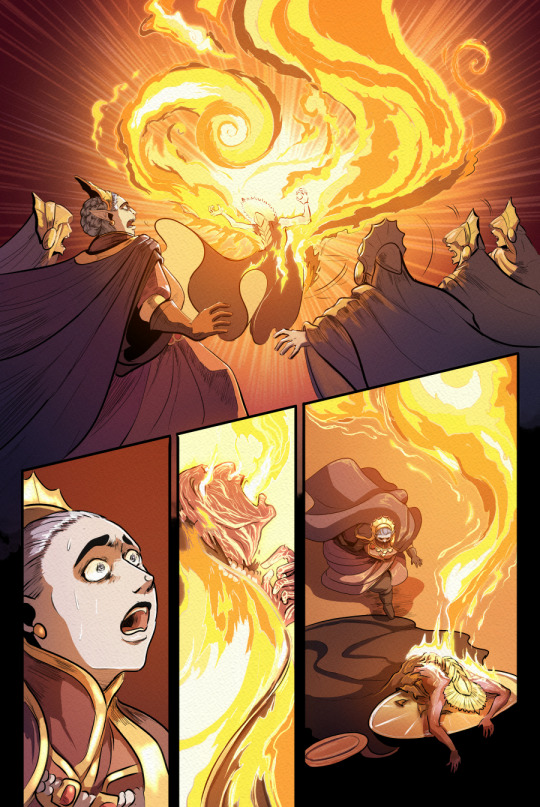
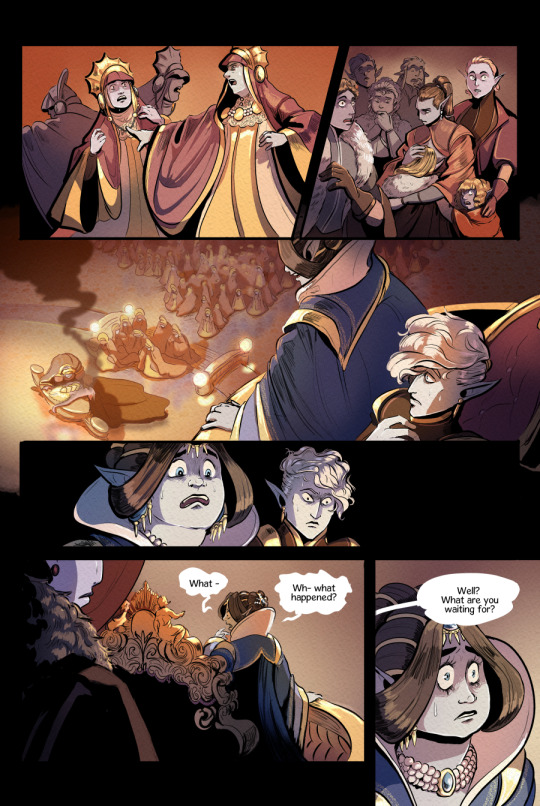
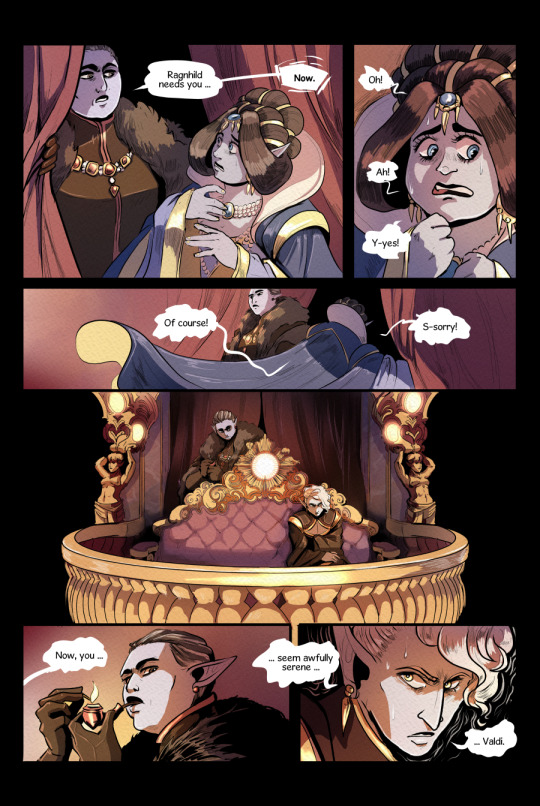
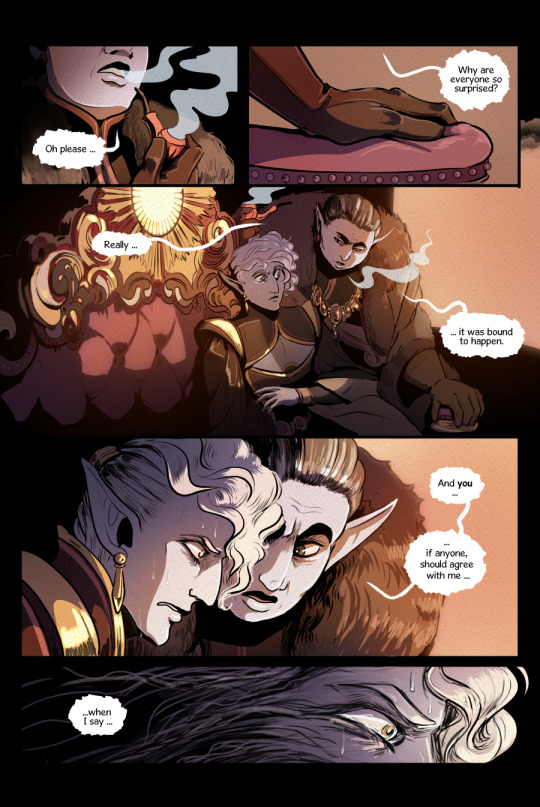
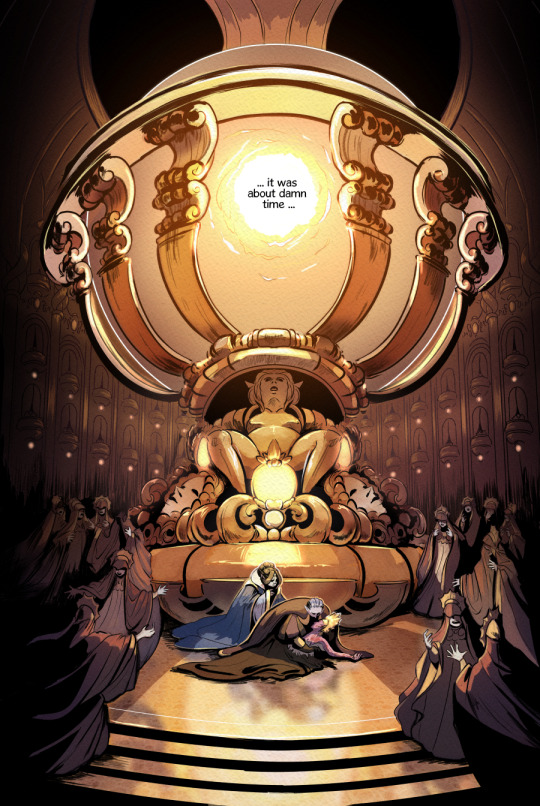
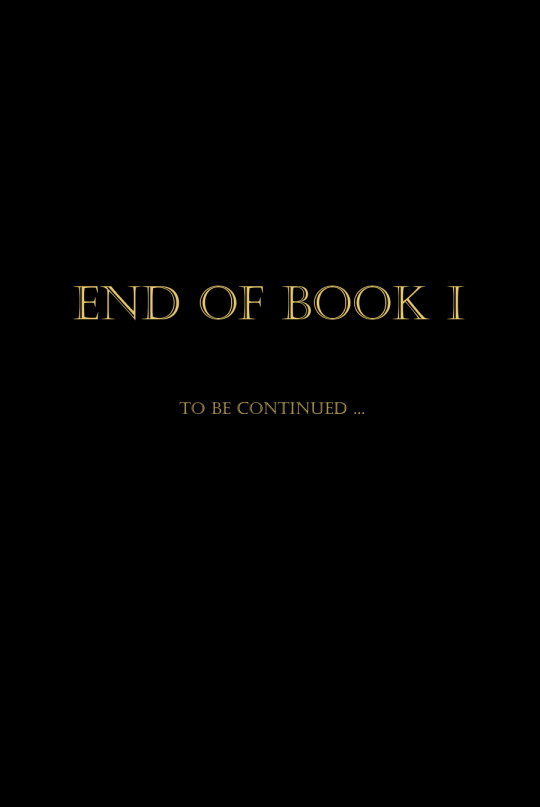
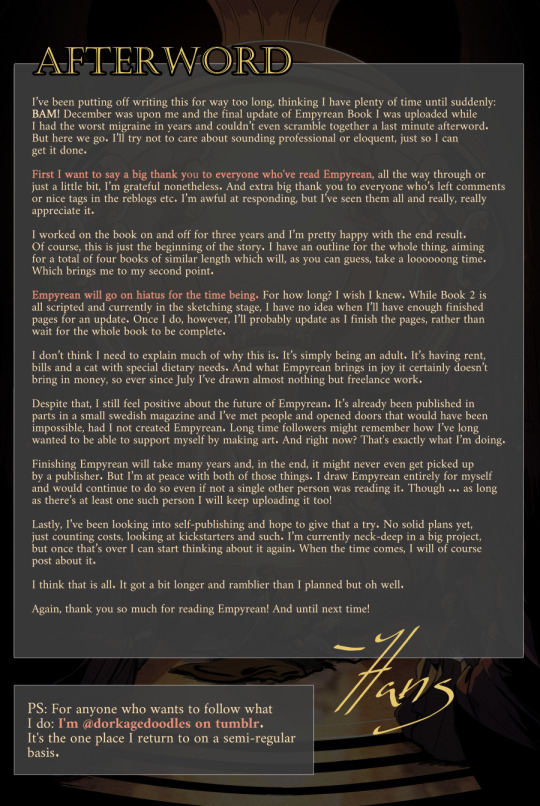
And there we have it folks - the end of Empyrean Book I! I sound like a parrot but just ... thank you so much for reading! Also, for everyone's convenience, the afterword is also in text under the "keep reading" bellow. <<< PREVIOUS ✧˖☆˖✧˖☆˖✧Page Archive✧˖☆˖✧˖☆˖✧
(To be continued ... ) AFTERWORD
I’ve been putting off writing this for way too long, thinking I have plenty of time until suddenly: BAM! December was upon me and the final update of Empyrean Book I was uploaded while I had the worst migraine in years and couldn’t even scramble together a last minute afterword. But here we go. I’ll try not to care about sounding professional or eloquent, just so I can get it done.
First I want to say a big thank you to everyone who've read Empyrean, all the way through or just a little bit, I’m grateful nonetheless. And extra big thank you to everyone who’s left comments or nice tags in the reblogs etc. I’m awful at responding, but I’ve seen them all and really, really appreciate it.
I worked on the book on and off for three years and I’m pretty happy with the end result. Of course, this is just the beginning of the story. I have an outline for the whole thing, aiming for a total of four books of similar length which will, as you can guess, take a loooooong time. Which brings me to my second point.
Empyrean will go on hiatus for the time being. For how long? I wish I knew. While Book 2 is all scripted and currently in the sketching stage, I have no idea when I’ll have enough finished pages for an update. Once I do, however, I’ll probably update as I finish the pages, rather than wait for the whole book to be complete.
I don’t think I need to explain much of why this is. It’s simply being an adult. It’s having rent, bills and a cat with special dietary needs. And what Empyrean brings in joy it certainly doesn’t bring in money, so ever since July I’ve drawn almost nothing but freelance work.
Despite that, I still feel positive about the future of Empyrean. It’s already been published in parts in a small Swedish magazine and I’ve met people and opened doors that would have been impossible, had I not created Empyrean. Long time followers might remember how I’ve long wanted to be able to support myself by making art. And right now? That's exactly what I’m doing.
Finishing Empyrean will take many years and, in the end, it might never even get picked up by a publisher. But I’m at peace with both of those things. I draw Empyrean entirely for myself and would continue to do so even if not a single other person was reading it. Though … as long as there’s at least one such person I will keep uploading it too!
Lastly, I’ve been looking into self-publishing and hope to give that a try. No solid plans yet, just counting costs, looking at kickstarters and such. I’m currently neck-deep in a big project, but once that’s over I can start thinking about it again. When the time comes, I will of course post about it.
I think that is all. It got a bit longer and ramblier than I planned but oh well.
Again, thank you so much for reading Empyrean! And until next time! -Hans
58 notes
·
View notes
Text
a newsletter some of y'all may be interested in subscribing to
By John Dupuis
Welcome to the latest issue of the Covid-Is-Not-Over Newsletter! A couple more issues during December before I take a little break from regular issues and publish a couple of filler “Bonus” issues. I’m definitely looking forward to a couple of slower weeks of holiday movies and fun books. I’m thinking of a Lord of the Rings rewatch this year. LotR are holiday movies, right? Right?
Mini-theme this week seems to be librarian-friendly, with a couple of colleagues writing about Information Literacy and the pandemic and how we’ve gotten ourselves in this rather amazing fine mess. How can all that good information be available to seemingly smart people, and yet it doesn’t seem to sink in? How can Long Covid fly under the radar, ignored or psychologized?
One thing that I want to remember from last week is that appalling Lisi Tesher article. You may recall that Lisi Tesher is the Toronto Star agony aunt who gave a horrible response to a letter about how to accommodate a Covid cautious person at a wedding. Tesher basically called the person mentally ill. Appalling.
Anyways, clear air advocate Ryan Tennant wrote a fantastic response as a letter to the editor at the Waterloo Record, which republishes Tesher’s column. Here’s a little bit.
In the context of COVID-19, we should respect and support individuals who make choices to protect their health and the health of those around them, especially when science justifies it.
For weddings and similar gatherings, a compassionate response would have offered creative ways to understand and incorporate evidence-based health protections against COVID-19, ensuring everyone feels valued and safe.
I urge this publication to ensure its contributors are equipped with accurate information and an appropriate tone for readers seeking support.
If you are the grudge-holding type of person, perhaps it’s not too late to encourage Ms. Tesher to read this week and last. The Star’s Life section email is [email protected], the city editor is [email protected] and Ms. Tesher herself is at [email protected].
This week I also highlight some more on Trump and public health, not to mention some revolution-making, rabble-rousing, high-energy jazz.
Like! Share! Subscribe!
As most have probably noticed, there is no paid subscription option for this newsletter. However, Substack does have an option where subscribers can pledge to subscribe “just in case” and a few kind subscribers have made that pledge. I very much appreciated the vote of confidence in what I’m doing here. What I’ve decided to do on a trial basis is to set up a “tip jar” on the Ko-fi platform. I’m not anticipating a huge surge of income from using Ko-fi but whatever revenue I do end up with, I plan to spend on supporting artists on Bandcamp.
Be my secret Santa!
It’s not about information literacy: Why people’s risk calculus around COVID has changed by Meredith Farkas / Information Wants to Be Free: The Newsletter I don’t think information literacy is the issue here. Most people I know are quite smart, well-read, and adept at research. I don’t know if they read things about COVID anymore, but if they’re not, it’s not because they don’t know how to find it. I think a lot more is happening with people who avoid COVID information and ignore risks and I think it’s a mix of personal psychological factors, privilege, the absolute disaster that was public health messaging around COVID, and social pressure to align with the dominant narrative that COVID is over. I know we like to distill things down to a single cause (“they’re selfish!” “It’s Biden’s fault!”), but this is considerably more complicated.
Many of us are dealing with pandemic fatigue, which is a lot like burnout and leads to a “demotivation to engage in protection behaviors and seek COVID-19 related information” (Haktanir, et al., 2022, p. 7315). Ford, Douglas, & Barrett (2023) describe pandemic fatigue as “a complex set of emotions comprised of anxiety, hopelessness, depression, and anger.” There are a few of reasons people become fatigued in this way. The biggest is simply the length of time we were all expected to stay in a state of emergency and hypervigilance. Living in that state with no clear end in sight can easily lead to burnout as many of us who have worked in high stress jobs can attest. You can’t stay in a state of hypervigilance forever without eventually becoming exhausted and desensitized (Koh, Chan, & Tan 2020). Chen et al. (2024) found that even when they controlled for pandemic severity at particular points in time, pandemic fatigue increased in study participants an average of 5.8% every six months of the pandemic. Instead of vilifying folks who experience pandemic fatigue and decrease their precautions, the WHO portrays it as “a natural and expected reaction to sustained and unresolved adversity in people’s lives,” (7), an approach which I personally appreciate. Shame is not a motivator and these are very normal psychological responses.
Advice for U.S. Government Scientists: Lessons Learned From the ‘Muzzling’ of Their Canadian Counterparts by David Shiffman / The Revelator Step One: They Can’t Delete What They Don’t Exclusively Control
For scientists working at government agencies, they suggest making copies of everything so it can be stored somewhere else — and to do that as soon as possible, certainly well before the next administration starts.
For example, does your agency have a publicly funded database, report, or educational website that has anything to do with climate change, conservation, diversity, equity and inclusion, or public health? It’s very likely that the next administration will try to suppress or delete at least some of it. A nongovernment partner, such as a university or large nonprofit, can host copies of these important documents and data if they’re shared in advance.
These efforts are already underway, but it’s vital to spread the advice as far as possible, as quickly as possible, so no data is left vulnerable.
New Zealand Covid inquiry finds vaccine mandates were ‘reasonable’ by Australian Associated Press / The Guardian A royal commission into New Zealand’s Covid response has largely accepted the need for vaccine mandates, while accepting they harmed a substantial minority of New Zealanders.
The first of two inquiry reports on the pandemic was released on Thursday and also called for broad investment to plan for the next pandemic.
A headline finding is that New Zealand had one of the lowest rates of Covid deaths for each head of population among developed countries.
The most contentious of the issues surveyed was the use of lockdowns and vaccine mandates, which helped to curb the spread of the virus, but at the cost of social cohesion and trust in government, according to the report.
“Contentious public health measures like vaccine mandates wore away at what had initially been a united wall of public support for the pandemic response,” commissioners Tony Blakely, John Whitehead and Grant Illingworth wrote.
“Along with the rising tide of misinformation and disinformation, this created social fissures that have not entirely been repaired.”
Another finding was “it was reasonable to introduce some targeted vaccine requirements based on information available at the time”, but the case was weaker from early 2022 when the Omicron variant took over.
The COVID inquiry report is an excellent guide to preparing for the next pandemic – health cuts put that at risk by Michael Baker, Amanda Kvalsvig, Collin Tukuitonga, Nick Wilson / The Conversation The report concludes that New Zealand’s adoption of an elimination strategy was highly successful, but had wide-ranging impacts on all aspects of life.
The strategy required early use of border controls, lockdowns and other restrictions which helped prevent widespread infection until most of the population was vaccinated. This response gave New Zealand one of the lowest COVID mortality rates globally.
The report also found that as the pandemic progressed into late 2021, the negative impacts increased. Controlling the pandemic was focused on mandates, including restrictions on public gatherings, quarantine and isolation, contact tracing, masking and vaccination requirements.
The effects included declining trust in government within some communities and loss of social cohesion. Vaccine hesitancy emerged as a growing challenge to the vaccine rollout, fed by exposure to misinformation and disinformation.
The prolonged pandemic and lack of a clear exit strategy from elimination added to the difficulties, according to the commission’s report.
Almost a third of preteens, teens with long COVID still not recovered at 2 years, study shows by Stephanie Soucheray / CIDRAP A new study from UK investigators shows that—while most COVID-19 patients ages 11 to 17 who reported long-COVID symptoms 3 months after the initial infection no longer experienced lingering symptoms at 2 years—29% still did.
The findings, published in the journal Communications Medicine, come from the National Long COVID in Children and Young People cohort study, which followed up on thousands of young people after their COVID-19 diagnoses. …
Overall, 20% to 25% of all infection status groups reported three or more symptoms 24 months post-testing, with 10% to 25% experiencing five or more symptoms. Not all who reported symptoms, however, met the formal criteria for long COVID. In fact, five or more symptoms were reported by 14.2% of those who never tested positive for SARS-CoV-2, and by 20.8% of those with at least two infections.
Older teens and females were most likely to meet formal definitions, the authors said. "We did not find that symptoms or their impact differed by vaccination status," the authors wrote.
Independent Long COVID Journalism as a Lens for Critical Information Literacy: Conversations with The Sick Times Founders Betsy Ladyzhets and Miles W. Griffis by Andrea Baer / Communications in Information Literacy The realities of COVID-19 and Long COVID and their ongoing impacts are unsettling. In a world of information overload, when we face numerous wicked problems that have no simple or complete solutions, it’s understandable that we may sometimes want to simply look away or may, at times, feel paralyzed and throw up our hands. Some readers may, like me, ask themselves to what extent to engage with wicked problems like COVID-19 in the realm of information literacy, given how polarized and taboo this topic has become and given that most discussions about COVID-19 place it in the past tense (e.g., “postpandemic,” “post-COVID era”). Some readers may also, like me, ask themselves how examining reporting on complex topics like COVID-19 might inform their teaching practices more broadly. I would like to do more of the latter along with others, and do so with critical reflection, care, and an ongoing practice of perspective-taking. …
COVID-19 and Long COVID, similar in many respects to climate change, are not going away, and they affect us all, albeit to varying degrees and in different ways. The Sick Times is a concrete example of people and communities making a positive difference for many in the short term, while also growing connections and efforts that necessary for larger and more systemic change over the long term.
Long COVID is becoming a serious social and economic issue for Australia by Jason Murphy / Crikey Among the current generation of kids, many are growing up with their mother or father confined to bed or confined to bed themselves. According to a study by ANU, long COVID is hitting up to an estimated 20% of Australians three months after they contracted COVID — mostly women, but also men and children. In the current COVID wave, that means a lot of people coming down sick for a long time.
Long COVID is keeping people from their jobs and their lives, and as COVID cases continue, it is unclear whether the rate of new long COVID cases is increasing faster than the old cases recover.
‘I was in denial about it’: actor Matt McGorry on having long Covid by Estelle Tang / The Guardian What does risk mitigation look like for you, and what did you want people who don’t have long Covid to take away from the video?
The risk mitigation in my life is very high. When your health is taken away from you, you realize how important it is. There’s not much that feels worth the risk of another Covid infection.
I don’t necessarily expect that everyone does or should do what I’m doing, but the number one thing is having a very well-fitting respirator. For maximum protection, you need something that forms an airtight seal. While you may get some protection from a surgical mask, if you’re already taking that step, it makes sense to find something that seals to your face. I wear the Flo mask, which is a reusable mask. People definitely look at it, and I have all sorts of feelings about that. I used to love to people-watch, and now I don’t any more, because people are watching me. …
My asks are very simply masking, at the very least, in places where disabled and immunocompromised people have to be: grocery stores, medical settings such as doctors, offices, pharmacies, hospitals, and transportation like planes, trains and buses.
Even as an act of solidarity, picking a couple of those places, making a commitment to that and making that known is incredibly important. As someone who feels extremely isolated and abandoned by the rest of society, I don’t have the capacity any more to ask individual people in my life if they will take this on. That’s what the video was for.
Long COVID pandemic in the aftermath of the acute phase / Centre for Pandemics and One-Health Research Why is this topic important?
It is important for many reasons, but I would say the main reason is that this is a problem that affects a large fraction of those with acute infections or certain acute infections. In this COVID study with adolescents, we found that approximately 47 percent had long-term sequels, and quite a high percentage of these would fulfil the criteria for chronic fatigue syndrome, which is a debilitating situation. That is quite similar to what we have seen after other infections. For instance, with kissing disease, six months after the infection, you are left with 10 to 15 percent with a chronic condition and with functional impairments.
The good news is that the majority, especially in the younger age group, will recover spontaneously. However, this can take a long time, and in adolescent medicine, this is one of the major causes for functional impairments in adolescents. So, it has a significant impact on people´s functional capability. It is necessary to understand the details of the pathophysiology for treatment, prophylaxis and prevention. The first step is, therefore, to understand what is going on. The next step is to conduct clinical trials in order to try to treat this phenomenon. This is something my research group is doing as part of the research.
For the love of God, Covid isn't over - so can people please wear masks? By Sam Williams / Canary A week ago, my wife and I went to John Lewis to look at air fryers. As we entered the store, I put on an FFP3 mask because of Covid. My wife looked at me in disgust and said, “Oh, you’re wearing a mask?” I replied, “Yes. There’s a lot of Covid around, and I don’t want it. Do you?”
She responded, “Well, the trouble is, I’m not wearing a mask”.
I said, “Yes, I can see that. I wish you would. The trouble is, every time I’ve caught Covid, it’s been from you. I’m disabled with long COVID, and every time I get reinfected, it makes me really, really ill”.
So here’s my question: does my wife not care?
I want to use this piece to spark a debate about who we are as people. Are we kind and virtuous, or are we selfish and indifferent? Writing an article about what stops people from wearing masks, while I live with the pain caused by my wife not masking, feels like an oddly meta activity.
That’s right, folks: it was probably my wife who gave me Covid in the first place. Although, to be fair, neither of us knew about masking or long Covid back then.
Want to Limit Respiratory Virus Infections? Mask and Test in Hospitals by Rachel Robertson / MedPage Today Stopping universal masking and SARS-CoV-2 testing in hospitals led to a surge in hospital-onset respiratory viral infections relative to community infections, a cohort study found.
After these safeguards were removed, there was a 25% jump in hospital-onset respiratory viral infections compared with the preceding Omicron-dominant period (RR 1.25, 95% CI 1.02-1.53), reported Theodore Pak, MD, PhD, of Massachusetts General Hospital in Boston, and colleagues.
When hospital staff began masking again, the rates of hospital-onset respiratory viral infections decreased by 33% (RR 0.67, 95% CI 0.52-0.85), they wrote in a JAMA Network Open
Testing and Masking Policies and Hospital-Onset Respiratory Viral Infections by Theodore R. Pak,Tom Chen, Sanjat Kanjilal, et al. / JAMA Network Open In this study, stopping universal masking and SARS-CoV-2 testing was associated with a significant increase in hospital-onset respiratory viral infections relative to community infections. Restarting the masking of health care workers was associated with a significant decrease. Limitations of our analysis included a lack of concurrent controls, possible variations in compliance, difficulty disentangling effects of testing vs masking, and potential case misclassification. However, medical record reviews suggested most hospital-onset cases were true acute cases.
Nosocomial respiratory viral infections remain associated with increased length of stay and higher mortality in hospitalized populations. Our data suggest that masking5 and testing were 2 potentially effective measures to protect patients who are hospitalized, particularly when community respiratory virus incidence rates were elevated.
Long Covid-19 Weakens Immunity In Children, Increases Risk Of Infections: Study by Himani Chandna / News18 Children experience weakened immunity and bacterial infections after suffering from long Covid-19 syndrome, a study published in the medical journal Nature has revealed.
Persistent fatigue was the most common symptom in children with long Covid syndrome, while the majority of children often complained about anxiety.
Is H5N1 (Bird Flu) the Next Pandemic Causing Virus? / LIL_Science One critical aspect of H5N1 becoming a pandemic causing virus is developing person to person transmission, this has not yet been reported for the virus. However, research published December 2nd, 2024 in Nature Microbiology makes a strong case for increased virus shedding and hence airborne transmission being a key component of increased infectivity. The researchers found that increased viral shedding in H5N1 found in an infected dairy farm worker but not in H5N1 that infected the in cattle themselves. This means the virus in that person had changed in a way that allowed for improved airborne spread. This supports prior research published October 28th, 2024 in Nature showing that the same virus strain (A/Texas/37/2024 (huTX37-H5N1) had acquired a mutation that improved the virus’s ability to infect human cells and increased lethality in animal models.
Repeat human infection gives the influenza virus more chances to develop mutations. Within the last month several reports have indicated that H5N1 is moving closer to person to person transmission while maintaining it’s highly pathogenic nature, exactly what we don’t want.
I have gotten hundreds of questions on social media about this so I will start with some of the basics to help everyone navigate what might be coming next. Let’s dive into where H5N1 came from, why is it more concerning than annual influenza strains, and what can we do to protect ourselves?
'Mistaking Covid as a cold may put people at risk' by Nikki Fox / BBC An NHS matron said that too often people were mistaking Covid for a common cold and a lack of testing could be putting vulnerable people at risk.
Lana Goodwin, who works in Covid services at Mid and South Essex NHS Foundation Trust in Billericay, Essex, said she believed people who were not high risk "feel that Covid has gone".
She added that statistics showed many vulnerable people were also not aware they were eligible for anti-viral drugs.
Ms Goodwin said: "I feel the public see [Covid] symptoms as a cold and it doesn't trigger off a response to test."
Ms Goodwin said that her clinic had people testing positive for the virus every day and vulnerable people were "unfortunately still dying from Covid".
#mask up#public health#wear a mask#pandemic#wear a respirator#covid#covid 19#still coviding#coronavirus#sars cov 2
40 notes
·
View notes
Text
That One Dramione Fic That Broke Me.
I’ve been thinking about this fic (The Sun, The Moon, The Truth—hereinafter TSTMTT) for the past week, since I finished reading it, and I realized that I need to write out my thoughts or else I’ll explode. For anyone who’s ready to type ‘BUT YOU CANNOT REVIEW FANFICTION’ this is not a review. This is an analysis.
You know how video essayists sometimes start their videos with a quote from the film or a book that they then go on to analyze, followed by an impactful pause? Imagine that this is a video essay. And it begins now.
[ff: The Sun, The Moon, The Truth by fantomas]

Be a tree, a fearful tree and timid,
Ne’er know peace of heart but tremble always.
Let the rain torment you without mercy
Let the wind pull madly at your tresses.
(From TSTMTT Interlude: The Lovers)
[Pause.]
The first chapter of TMTSTT was published on ao3 on November 2023, and I’ve been it’s loyal reader ever since. When the uploads paused in May, I reread the first three Acts over and over again, looking for clues, trying to guess what was going to happen next. Not to brag, but I guessed a lot. Not because I’m Sherlock Holmes, but because there were clues in every single chapter, and because this fic uses literary techniques that are evident to a seasoned scholar like me. Everything was thought out. The characters, the metaphors, the complex nature of the narrative itself.
The story follows Hermione as she wakes up from a months-long coma with no memory of the last ten years. Harry tells her that she’d spent the two years leading up to the coma in the hands of the mysterious Phantom—the man whose identity is unknown to both Harry and Hermione, and who, as Harry says, held Hermione as his captive, raping and torturing her. But the truth is not as it seems—when the Phantom kidnaps her again, Hermione starts to remember what truly happened to her. And it is one of the most trippy and terrifying journeys.
Memory is a tricky thing. It is a peculiar and fragile construct, shaped as much by our perceptions as by reality itself. It is both a map of our past and a filter through which we understand the present, yet it is unreliable—a patchwork of moments stitched together by emotion, bias, and time. Trauma can fracture it, leaving behind jagged edges and dark voids, while love can amplify or distort it, softening painful truths into something bittersweet. Memory is not just about what we recall; it’s about what we choose to forget, what our minds protect us from, and what might lurk in the shadowed corners, waiting to resurface. In the forests and castle of Hermione’s mind palace, the truth is not what it seems, so much so that we never truly find out what the truth is. Is the Phantom evil? Is Harry evil? Is Hermione evil? Who can say?
I tried to draw a scheme of the time loops in this fic, and what i got were quote some earrings—the snake eating its tail, which, I would argue, is one of the main ideas of this fic. This snake shows up as a metaphor numerous times, and twice—as an actual snake. Time is just as subjective as memory, and just as personal. In this fic, the past, present and future all exist in the same timeline, which immediately makes me think of Saint Augustine’s philosophy. Saint Augustine is one of my favorite philosophers, and he claimed that at any given point in time of the present when we think about the past or the future we can ever only think about it from the point of view of that moment when we think about it. That is, if we think about the past, there is always only present past, because when we thought about the past in the past, there was only past past. The same applies to this fic. The non-existence of the boundaries of time and space are hard to see in the flashback chapters, and yet even in the smallest of glimpses, it is quite effective: one of the first instances is when Hermione sees her self on the other side of the river, battered and bruised, and we know that this is the Hermione from act one, that is Hermione from the future, because we read an identical scene in act one. Flashback Hermione is followed around by a ghost of a Death Eater—that Death Eater is guilty for George’s accidental death and for many other things that happen to Hermione, and although it is never clearly stated whether that Death Eater ghost is Draco from the future, I think it’s safe to say that it is. The Death Eater ghost is the same Phantom that haunts Harry and makes him lose his mind—he comes from the future, yet he affects the present. There also an interesting tid bit of Narcissa describing flashback Draco as PhantomDraco which makes us wonder whether she can also see into the future or whether the time frames have blurred in her eyes too. My favorite blurring of the boundaries of time and space, however, is the scene where Draco meets Hermione’s ghost a few days after the Battle of Hogwarts. The ghost is from the future. She starts haunting him from then on, awoken by her own name coming from his lips. The story takes a full circle when we realize that Hermione haunts Draco because he’s the one who killed her and she is only visible to him because he ate her. This story is wild, isn’t it? The tragedy lies in the fact that Draco did everything he could to keep Hermione alive so she wouldn’t come back to haunt him, get eventually it is his actions that cause the string of events that lead to her becoming his personal ghost.
One thing I noticed was the use of seasons, weather. There was lots of mention of snow, water and ice, then fire, heat, flames. There was also a lot of metaphorical usage of the sun and the moon, which makes sense because it is in the title, but while reading I kept wondering what was the reason for it. In part one, snow, ice, and water symvolize Hermione’s inability to fully feel the consequences of her trauma and her “frozen” sense of self. The water reflect her deep yearning to recover what she had lost. There is a particularly vivid scene in one of the earliest chapters when Hermione where she watches the river flow by as she reflects on what happened to her. However, these memories are also “frozen,” which is why the water is cold, and there is ice in the river. The pivotal element moving forward in act two is fire. It is the first thing she pays attention to when she finds herself in the Manor. In later chapters of act two, Astoria’s funeral fire awakens one of the most deep-seated, although false memories hidden in Hermione’s mind. Fire gradually melts the ice and snow confining Hermione’s mind and sense of identity. In the last chapter of act two, when the drawing room is set on fire, the flames make Hermione remember the truth. If we dare call it the truth.
I don’t think it’s that important to explain the meaning of the sun and the moon, and in this fic that meaning is quite traditional, the moon standing for something that is hidden (half of Harry’s face in the moonlight, the other half hidden—chapter one), and the sun is symbolizing clarity and rebirth, and is mostly embodied by Draco as he is often described as illuminated by sunlight, even if his eyes resemble “two full moons”. You might disagree that he is the good one, and he isn’t, BUT. Although we can never be sure what the truth of Hermione is, we can be sure that Draco was and always will be the key to that truth because he is the mastermind, he is the one in control, he knows the truth and is ready to do anything to be the only one to know it, so much so that he kills the old witch who tells him his future in fear that she might tell his secrets to others. He also symbolizes rebirth because he literally is reborn after he makes a horcrux—his physical appearance changes, making him terrifying and overwhelming—and he is also a vessel for Hermione’s transformation, as she becomes a ghost after going through his digestive system. In one way or both ways, Draco is the key to both of theirs immortality.
Transformation, in my eyes, is another key aspect of this fic. Not only Hermione’s aforementioned transformation, but Draco and Harry’s too. Let’s talk about Harry now. He is the only side character who gets whopping two chapters from his POV, same as Draco, which puts him into a position of being as important of a character as Draco, and just as mysterious. (And just as evil. Or really?) Harry, unlike other characters, goes through his transformation early on in the story while Hermione and Draco are still in tact. He transforms into his mad-self when Hermione accidentally flips a stone of the Hogwarts castle on top pf him and George. George dies, fuelling Hermione’s eternal guilt, while Harry survives, suffering a months-long comatose state, which mirrors Hermione’s coma that she wakes up from after he tortures her. After waking up, Harry is eerily different, yet not so different as to make Hermione believe he’s evil. Although Hermione convinces herself that Harry did not die in the accident, Harry claims that she did. Although Harry says that he doesn’t blame her for what happened, Hermione blames herself. Harry’s corruptive transformation ascends slowly and mostly off-page, yet we know where his way leads to even though we have no proof of him doing anything wrong, ever.
Harry becomes tortured with visions of the future, and knowing what is going to happen to him, he tries, just like Draco, to do everything he can to turn the wheel of fate sideways, yet, just like Draco’s, his visions come true. Knowing the future doesn’t protect one from it. Here is where Macbeth comes in. It is very literally mentioned in one of the conversations where Draco and Hermione talk about Macbeth and Lady Macbeth, and as they talk about them, we readers feel as if they’re talking about themselves. Having Macbeth as an intertext only furthers the feeling of inevitable doom.
The fate is inescapable. There is a god, or a higher power, that controls these characters as if they were puppets on strings. In numerous scenes, Hermione feels like she cannot control her body, that her body works on its own accord, as if someone would be in control of it. In the last chapter of act two, when she tries to kill PhantomDraco, yet her own hand turns her own wand against herself, is the scene which illustrates determinism in this fic the best. Determinism is the philosophical idea that all events, including human actions, are determined by prior causes and conditions, meaning everything happens because of something that came before it. Characters tried to do everything they can to escape their fate, yet they only end up solidifying the ineffability.
There are five characters, besides Harry and Draco, who get their own POV chapters, one for each—Blaise, Pansy, Daphne and Narcissa. These chapters serve a few purposes. The first is to show what an unreliable narrator Hermione is. Her understanding of the Slytherin gang as people is very limited, which makes sense and gives the story a sense of realism. Other people always have rich lives beyond what we perceive. The characters’ POV chapters reveal their inner lives and complex relationships with one another that Hermione doesn’t notice. The other purpose of these chapters is to show Draco from others’ POV. Apparently, all the other characters hate him because he is evil. In all the chapters, except these, Draco is shown to be kind and loving, but the key thing is that he’s like that when he’s with Hermione. When he’s with Blaise, or Astoria, or Pansy, he is an uncaring and egotistical monster. Blaise’s chapter is the first glimpse that we get of Draco’s true form. And we don’t get many chances like that. The third reason for these chapters is to show that characters mirror each other. I already mentioned that there are a lot of scenes that get repeated over and over again with some minor changes (symbolising the snake-like slithering of time and events), but the same applies to characters—they mirror Hermione, and each other. Blaise mirrors Hermione’s inability to take action when it comes to facing the truth (that Harry might be going mad; that the Order might be using her; that Draco is not what she thinks she is). Daphne mirrors Hermione later in life—upon their first meeting, Hermione judges Daphne for living inside a beautiful house with a murderer husband, growing flowers and taking care of Astoria without worrying about the state of the world; in act five, she becomes a wife locked in a house, growing flowers and taking care of Astoria (seemingly) without any other worries. Astoria, although without her own chapter, also mirrors Hermione even in the early chapters while they’re both sick. Their borderline-obsessive infatuation with Draco is a thing they have in common. Pansy mirrors Hermione’s wish to please others and to save the world in her own little ways (which, of course, never goes anywhere). Narcissa’s chapter is incredibly vivid and beautiful, and it mirrors the way Hermione’s mind gets wrecked in the later chapters.
Another thing to note is that these characters die without ever doing what they always wanted to do. Blaise dies after going mad and losing his mind, killing Daphne, the one person he swore to protect and save from the mess of war. Daphne dies being killed by the love of her life. Astoria, who spent her life in Blaise’s house wishing to get away and be back with her parents, dies begging Hermione not to move her, saying please, I don’t want to go. Pansy wishes to never lose herself, to never let evil take over her, and she dies as one of Harrys inferi, without a mind of her own, which in life was her greatest insecurity. Hermione dies from brain cancer caused by memory alteration, just like her mother. Narcissa dies by jumping off a balcony, just like Hermione’s father does after losing his daughter, just like Hermione attempts to do in the earlier chapter after “remembering” that PhantomDraco killed their daughter.
Now let’s talk about those god forsaken interludes. One folklore tale, one painting by William Blake, two poems, one heart-wrenching song, one play-like chapter… But firstly, I want to mention the epigraph which is a scene from the Bible, featuring one of the most well-known scenes of the great red dragon and the woman clothed with the sun. The woman is giving birth and the dragon awaits to eat the child. Many scholars interpret the dragon to be the devil, the woman to be Mary, mother of god, and the baby to be Jesus. This epigraph paints a picture of some evil threat hanging above Hermione, as of course, we interpret Hermione as the woman clothed with the sun. In the first act, there is some clever half-misdirection that makes us believe that Harry is the evil mastermind behind it all and that Draco is just a misunderstood antihero in love with Hermione, and so, having read this epigraph, we interpret that Harry is the dragon waiting to eat Hermione’s child. But then, in the later part of the fic, there is an interlude titled The Moon, which features the same exact scene as the epigraph, only in the form of the famous William Blake’s painting, although by then we have an entirely different context. The interlude follows after Draco creates a horcrux and turns into PhantomDraco, so right now, we interpret the bleached red dragon of Blake’s as Draco, while Hermione still remains the woman clothed with the sun, as Daphne titles her before dying.
But the very first interlude is a folktale The folktale Spruce, the Queen of Serpents of Spruce, the youngest daughter of a poor family, who is forced to marry a magical grass snake after promising to do so under pressure. The snake transforms into a handsome prince, and they live happily in an underwater palace, raising four children. When Spruce visits her family, her brothers trick her youngest daughter, Little Aspen, into revealing the prince’s name, which they use to summon and kill him. In grief, Spruce curses Aspen to forever tremble in fear as a tree, while her brave sons become mighty trees, standing tall beside their mother, who is also transformed into the Spruce tree. This tragic tale mirrors the one of Draco and Hermione, and even of their daughter, gifting us a glimpse into how it’s going to end, yet it’s not an exact copy of the folktale, it only serves as a metaphor, and also makes us root, undeservingly, for Draco, in belief that he is the lover. Another epigraph which is foreshadowing is the poem also by William Blake “The Sick Rose” which foreshadows that Hermione is going to be sick and that she’ll die. Another poem is “Lady Lazarus” by Sylvia Plath which tells a story of a woman who dies and dies and yet resurrects each time. This interlude is right before the epilogue, where we find out that Hermione became Draco’s ghost. The character of Lady Lazarus solidifies the fic’s biblical imagery. The interlude of the song, Poison Tree by groupie, is another William Blake moment, as it is inspired by a poem of the same name. In author’s note, it says: “[the song] uses metaphor, antithesis, and biblical associations to highlight the self-damage that can proceed from suppressing anger. The emphasis is on letting go of negative emotions and moving on with life before this energy impacts the health and well-being of others. This poem is an extended metaphor – the wrath (anger) becomes a tree, a fruit, a poison apple.” Again, this ties up the loose ends with biblical imagery, the symbol of a tree, and anger that Hermione feels towards Harry and everyone else who harmed her, Draco included. It precedes right before Hermione gains back her memories.
At last, why the hell are the chapters named after Tarot cards, you may ask? This is perhaps the simplest question I can answer. As per my interpretation, Tarot cards represent something that is written in the stars, coded in fate, something that is while possible to foresee, impossible to avoid. Each chapter being a Tarot card tells us one more time that this story won’t end well and that nothing that will happen cannot be avoided.
#dramione#fanfiction#hermione granger#ao3#dramione fanfiction#archive of our own#dramione fanfic#dramione ao3#text analysis#fanfiction analysis
16 notes
·
View notes
Text
I don’t understand anxiety about getting older.
I know that’s an unpopular thought but the thing is, I spent the years between 13 and 21 basically half dead and with one foot on the wrong side of a certain threshold and this year I turn 30.
When I was 19 the idea of living to turn 30 was… unbelievable. It was simply unrealistic. I was so sick and had been, by that point, so sick for so long that it was just… beyond unlikely to make it to three whole decades.
But now the thing is, I’ve had the surgery I needed to not die, it’s been eight years, I’m stable and as well as one can be whilst missing an internal whatever. And with every year closer to thirty I’ve gotten, it’s become more and more clear that 30 is. Nothing. 30 is SO young.
All of the jokes when I was growing up were about 30 being “over the hill” etc and what was the difference between 30 and dead but like. 30 is young. There’s so much i intend to do and want to do and WILL do and I don’t have crows feet yet and I still get pimples and I’ve also got most of a full grey streak in the front of my hair and everything we say about age makes all of this seem nonsense but I’m so glad to be alive still and I’m looking forward to my 30th birthday and I’m looking so so so forward to finally one of these days getting the books I’ve written published. And I know 19 year old me would be so disappointed in the state of my life right now: single, unpublished, still living in the United States. But I’m not 19 anymore. I made it to the year I’ll be 30. I still want at least some of those things (I want to be published I want people to read my works I want people to enjoy them) but I also… I don’t know. I want the crows feet and I want the white streak at the front of my hair to reach its full potential.
I don’t understand the anxiety about getting older. It just means we survived. So yeah in a few months I’ll be 30. And you know what? Thank god
116 notes
·
View notes
Text
belladonna | prologue

Too beautiful to resist, and too deadly to survive; the tragic tale of belladonna in all its glory.
Masterlist
Pairing: Danny Wagner x f!reader
Word Count: 2k
Warnings: mentions of toxic family situations, swearing, smoking
Welcome to the show 🥰 I’ve been incredibly excited to share this with you, so stay tuned for more!
WHERE IT ALL BEGAN
When faced with the tragedy of remembering, it is often perceived as something beautiful.
After living a life as painful as your own, reminiscing on the past is neither easy nor enjoyable.
A deadbeat father, and a stepfather who was present yet absent all the same. A mother who was all but kind, and two brothers who were made fully responsible for all of your successes and failures.
From the moment you were born, life seemed to find every possibly opportunity to strike you down. Despite the relentless effort, you stood up, you kept going, and you survived.
You did not realize until you were much older, but surviving was the easiest part, and the difficulties most often lie within the aftermath. Picking yourself up while still struggling with knowing who you are proved difficult, but you managed to settle yourself into a routine and found a safe place to rest while you pieced together your own personality. Just when you thought you could finally put the burden down for a moment, you found yourself amidst the hardest challenge of all; living a life that was far different than what was destined for you, yet still plagued with the memories of the little girl who once ran so you could walk.
You spent every waking moment avoiding the memories housed in your brain, and when you could no longer avoid them, you crumbled to the ground as you faced them head on. You deconstructed every notion you had of yourself and rebuilt from nothing so many times that your head began to spin when you thought of it for too long. You became a stranger to avoidance, and you made friends with your own demons. Eventually, you made a life out of the hurt that once limited you.
At a diner off the edge of town, you worked night shifts and weekends to make ends meet while you spent the daylight chasing after a dream that you feared might never come true. You went home every night in the dark, the smell of the deep fryer still lingering on your clothes as you smoked as many cigarettes as the walk would allow. When the sun rose in the sky, you would drag yourself out of bed and sit in front of the large panel windows in your living room and write until your mind went numb.
Stories of everyone and everything, synopses of books you wanted to, but would never publish, and poems to air out your own, relentless thoughts. Journals sat around the room, stuffed so full of pictures and words that the spines were near broken. Single pages floated around the space, some with only one word, and some with so many that you could barely read it underneath the mess. You did not have a lack of imagination, nor a lack of patience; writing is a long process, and a good book will take years (That’s what you told yourself, anyway). You lacked inspiration, something to give you the motivation to keep writing and to keep trying, even if you failed. You needed something to write about, because recounting your own tormenting sadness and loneliness was becoming unbearable.
You searched in dive bars with cheap liquor, wondering if you would find meaning at the bottom of (another) empty bottle. You searched in coffee shops with signs that were faded and falling down. You looked for it at the supermarket, in the reds of the strawberries and the greens in the apples. Your eyes gazed up at the old city buildings, wondering if an idea would spark from the crumbling cement and moss-ridden stones. Sometimes, you would pick the sprouts of weeds from the sidewalks to bring home with you in hopes that their beauty, despite their nuis of the gray concrete jungle aesthetic, would flood your mind with some type of passion.
Not even a life blooming amidst the city's fascination with destroying anything green could pry your mind away from the same old boring topics. Months of searching left you with nothing, and eventually, you began to give up on the idea of a muse entirely.
In the serenity of the diner on one particularly late-night shift, cutting through the stagnant air and filling your lungs with a breath of hope, you finally understood that a muse is not something that you go in search of, but rather something that seeks you when the time is right. The laughter was so beautiful that it made your knees go weak and your chest ache for a moment. You wondered how someone could evoke so much emotion within you without you even seeing their face.
The time, of course, was perfect, but when you finally caught sight of the thing you had been craving for so long, you realized that you were not prepared for what the search would bring.
In the diner booth, huddled in the very corner of the building by the window onlooking the streets, sat a man who turned your whole world upside down in an instant. A tattered band shirt with the sleeves cut off and a worn out logo magnified his strong arms, and his curly hair hung down over his shoulders to frame his beautifully crafted face. His jawline was sharp, angling down into a soft chin, and although large, his nose was stunning. His eyes, even from far away, managed to make your stomach flutter with curiosity.
He did not notice you, but god did you notice him, sitting across from a faceless man with long hair, laughing at a joke that was shared between them. His company, although facing away from you, seemed like the louder of the two, and his character bled from him as he spoke. You could not even muster the strength to crane and look at his face, because whatever he looked like paled in comparison to his company. You felt frozen as you watched from the kitchen window, hanging on to every small expression and drinking in every beautiful laugh that fell from his lips.
The first night he visited the diner, you could not find the courage to speak to him, nor could you even bring yourself to walk out into the dining room while he was still sitting. Despite your lack of conversation, you ran home that night and did not get a second of sleep; your nose was buried in a journal and you were too busy pouring your heart out on the paper. You wrote more than you ever had, and with more emotion than you could ever muster before.
The nameless boy was everything you were looking for and more, and proved that a muse was more than a ruby red strawberry amidst unripe fruit, and much more than a measly weed growing between the cracks in the sidewalk. You had been aimlessly searching for inspiration within the inanimate without even considering the fact that the most profound words would be inspired by a living, beating heart.
You vowed that the next time he stepped foot in the diner, you would make your move. You would introduce yourself, smile and take his order as if he hadn’t completely changed your world without even knowing it. You needed more than an echoing laugh, and more than a glimpse from around the kitchen wall. You needed to know him, down to the very things that made his heart beat.
Firstly, you needed his name, and without it, you could not find any more passion. You had milked every opportunity from the miniscule amount of time you had been blessed with his presence (which, admittedly, was a lot).
You needed him in your life, and you needed more than you could even begin to comprehend, because after a lifetime dedicated to forgetting, you found something that made you desperate to remember.
Unfortunately, your life had proved that remembering would ultimately be your demise, and your unwillingness to forget him would turn out be your worst nightmare.
A muse is a source of inspiration in all forms, and the most deadly (and the truest) form of inspiration is a heartbreak greater than itself.
Daniel Wagner was in fact your biggest muse, and to be a true source of inspiration, he was also destined to be the biggest heartbreak you had ever experienced.
05.19.22
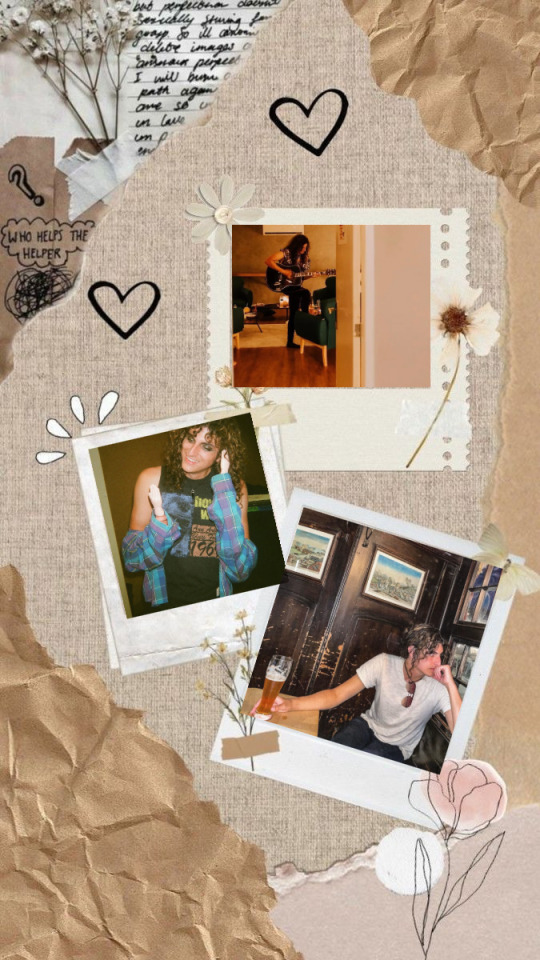
06.21.22
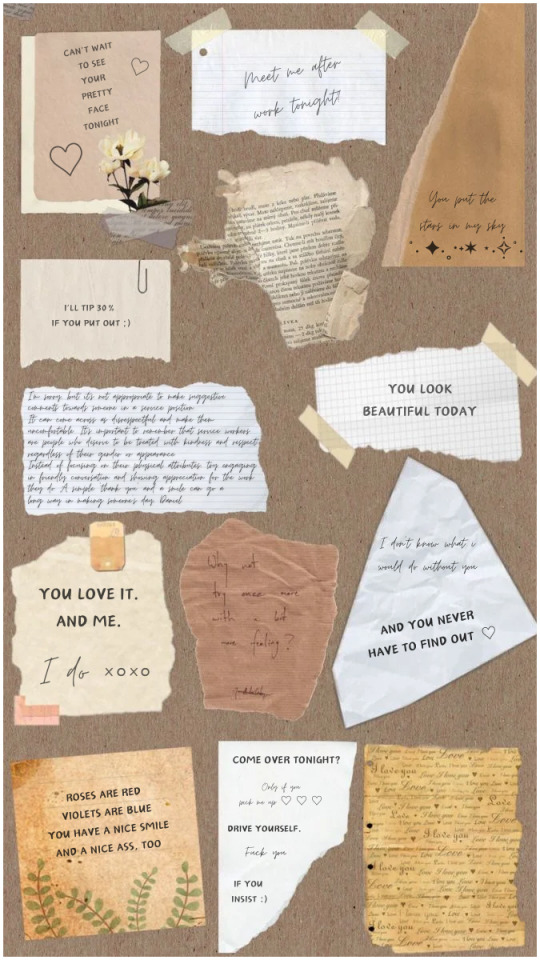
07.04.22
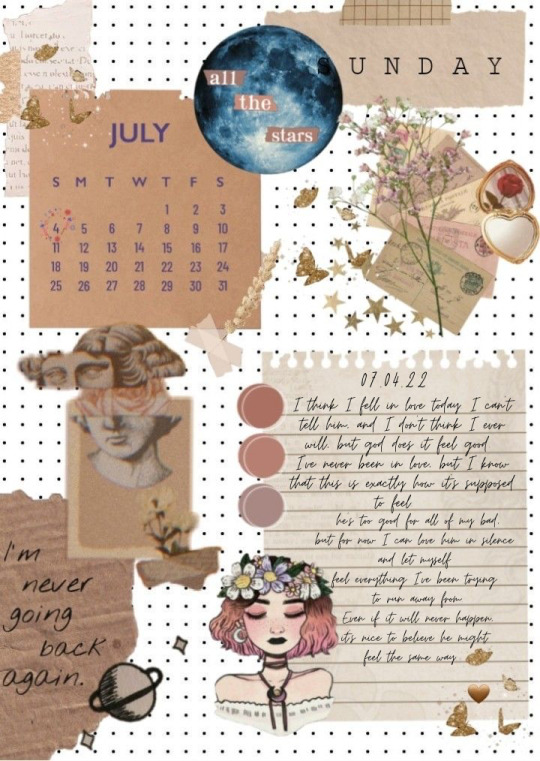
08.02.22

08.31.22
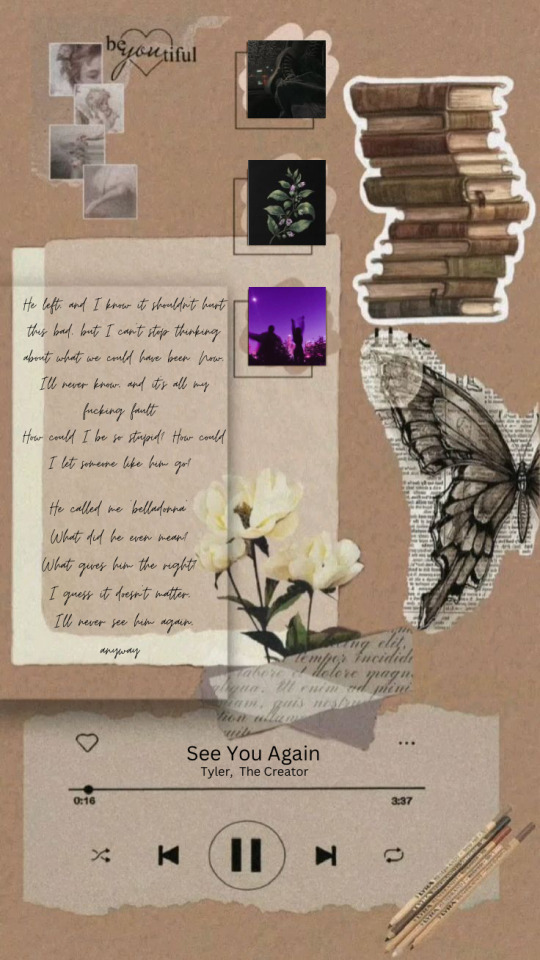
09.15.22
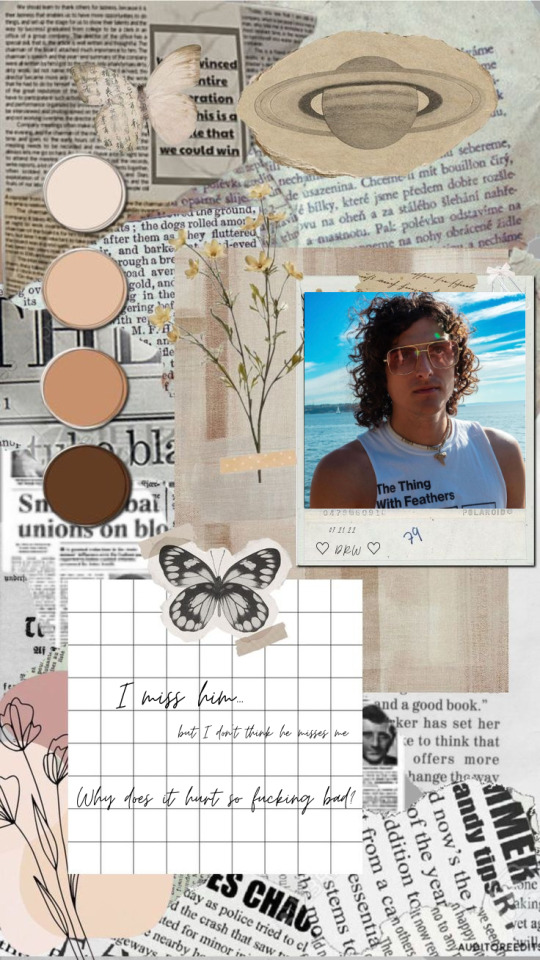
Character Guide
Y/N
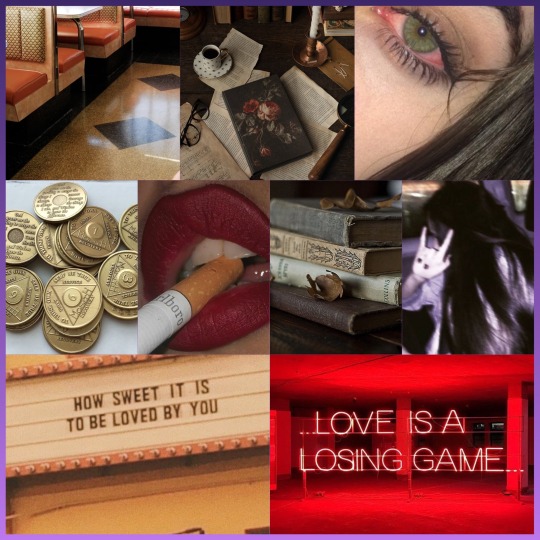
Vincent
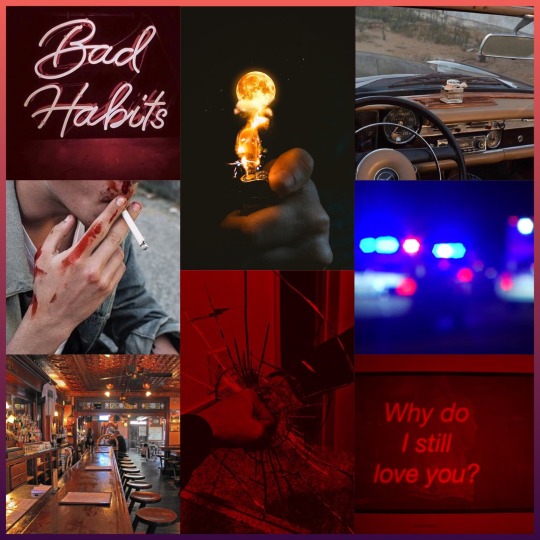
Dylan

If you would like to be added to the taglist, please fill out this form 🤍
#gvf#danny wagner#danny gvf#gvf fic#jake kiszka#greta van fleet#sam kiszka#jake gvf#sam gvf#josh gvf#danny wagner series#danny wagner fluff#danny wagner angst#danny wagner smut#danny wagner fic#danny wagner x reader#gvf angst#gvf fluff#gvf smut#greta van fleet angst#greta van fleet fluff#greta van fleet fic#greta van fleet smut#greta van fleet fanfic#builtbybrokenbells#belladonna#daniel wagner#daniel gvf#gvf series#daniel wagner fic
58 notes
·
View notes
Text
Hellenite
Is there ever that one writer that you keep on going back to, over and over, even if you have read and analyzed every single one of their works? And it still gets better each time? There is for me. Fucking Helleniteeeee. I left the DSMP fandom like almost a year ago, yet I still go and have Hellenite binge reads on the regular.
Ad astra was my gateway drug, De Terra is still my favorite fic of all time like ever, possibly even better than most published books I’ve read, anything from LiTWS brings me immense comfort, and Fading Lights….that one stuck with me really really REALLY hard. So did all the other ones, but yknow. That’s a bittersweet ending done right, man. I absolutely adore everything in Hellens style of writing. From the beautiful, captivating description to the absolutely remarkable use of italics, each and every fic has left me crying and begging for more. But there’s three parts that Hellen just does so well, that it honestly shocks me that the whole first page of DSMP isn’t stuffed, head to toe, with Hellenite’s work.
1: Theme
Tackling this first, cause i have a LOT to say about this. Cause, HOLY SHIT!!! Theme! I absolutely just HDRTHHFGGJGJHAZJ. I’m not saying other writers haven’t pulled off themes in fanfic well before, cause they have! But the way Hellenite does it just hits different. Everything has a moral, in one way or another. And the moral is something genuine. Something real, something that happens in real life and that is represented perfectly in all her works. Like, okay. Event Horizon: You can change, you can improve. You are not your past, you are not your family, you are not your mistakes. As long as you’re trying, You’re on the right path. Things don’t get better immediately, they take time. A long, long time, but you are allowed to be happy along the way. Healing is a process, not a teleportation device. LiTWS: A relationship, be it romantic, platonic or familial, can be complicated. They can be difficult to maintain, but you love the other person, so you will work at it to solve your issues. It’s okay to fight, as long as you can acknowledge when you screw up. Communicate. Fading Lights: Life is difficult, but that doesn’t mean you should try and escape it. Find the right people who care about you, even if at the moment you feel or are complete shit. You can recover.
everything just leaves a special impact, because those messages come through. And they come through strong, without being all “LOOK AT ME IM HERE”. It’s just. Wow.
2: Character Development
Change is a very prominent feature in Hellens stories, and it never feels clunky or out of place. You genuinely feel it, but you can’t pinpoint the exact moment things change. Like how in the beginning of Ad Astra, we feel genuine dislike, and very quickly, hatred for Ran. But over time, that changes, and we see how Ran develops and improves. There’s setbacks, there’s relapses, but the change is there. In LiTWS, the relationship goes from somewhat forced, to fully, truly, genuine. Struggles and all. In FL, Tubbo….well. In the beginning, he was an addict who had a gruffish attitude, who was pushing away from society and his friends. He feared that he was turning into his father. He had awful self esteem. By the end, he was willing to change. He was willing to give up smoking and drinking and willing to put himself in an environment that involved Tommy. Change, change, change.
I think it’s all really well done. Cause people change, it’s natural. And it’s done so well here.
3: Love
The way Hellen writes love makes me wish I was in it. But not because it’s written as an all happy and sunshine solution to all wrong. It’s not. It’s written as a strong, complicated emotion. It isn’t written as a one-size fits all. It’s written as something rooted in our hearts that WE get to define, and WE get to use. We love, and it is not a weakness. Love is not a superpower. We all are capable of it, and it doesn’t have to be romantic. Love is…love. It’s so, so SO strong, and I think that this one element is what’s made me cry so much while reading Fading Lights or De Terra or whatever it is. Love. Such a strong meaning for such a small word. I go to Hellens stories and take notes on the way it’s written because it’s just. I hate stories that focus on love, generally. Mostly because they’re written as if it has to be this huge, romantic beats-all card, where the only thing that defines it is the word itself. The characters have to say it for us to know it, and even after that, we don’t believe it. Hellen writes it as it is, which is a difficult feat. These fics are just…wow.
All in all, the way Hellen writes, not only in short term by description and beautiful scenery, but in long term too, leaves such a strong impact. Hellen is definitely, without a doubt, the writer who has most inspired, motivated and influenced the way I write and even the way I think. Hellen has left such a positive mark on me that I’m confident I would be entirely different without having read that one gateway fic. I forgot to mention this, but I read Ad Astra while in a reading slump, and when I say it pulled me out…
also, the concepts in and of themselves are so creative and good and original?? Like how?? And the WORLDBUILDING DONT GET ME STARTED ON THE WORLDBUILDING. HOW??? How does one just make a world so convincing and make it feel so real?? And explore upon it without making it feel like pointless exposition???
TLDR; A year ago, these fics broke into my house, put me in a chokehold, and demanded it be allowed to live there rent free. It still has me in a chokehold, and I give it muffins sometimes.
Theres so much More i can say, and I will probably say it in different posts later. but for now..
I love Hellenites stories more than I love Interstellar, and that’s saying something cause I was a mess by the halfway point of that movie.
Thank you, Hellenite, for each and every one of your stories.
I can’t wait for WGBITN.
(P.S: I realize I sound like an insane fangirl, but whatever. I most likely am one.)
101 notes
·
View notes
Text

WRITEBLR REINTRO – ANN LILLY JOSE
hello there!
following through with my tradition of posting a new writeblr intro every single year, here we go – a brand new reintro where i talk a little bit about myself and my current writing projects. so, here we go, onto all that good stuff!
about me
i'm ann, a twenty-year-old writer from kerala, currently based in kochi
i live with my husband, who is a musician, and lead a very creative life of sorts
i'm an infp, enneagram type 2
i write literary fiction and poetry
i'm a discovery writer and have a thing for sad stories with traumatised characters
i work as a content writer and social media manager for a wedding company
you can find all my published work on my linktree
my aesthetics: wilted flowers, fallen leaves, silhouettes, shadows, gentle friendships, indie music, unplanned trips, birds, fireflies, annotated books, old libraries and buildings, post-colonial literature, voids, romance
my wips
i recently finished a litfic novel called dairy whiskey and am editing it right now, hoping to get it ready for agent submissions in a month or two. i put my heart and soul and blood and bones into it, so if you’d like to dive into the story and read a few excerpts, you can check out the intro here and every other excerpt here!

rock salt is my main wip since finishing dairy whiskey. it is the story of identical twins rain and norah as they move out for college and navigate their lives on their own, which ends up in them growing apart. if you like complicated sibling relationships and the struggles of growing up, you’ll love this book!
i so badly want to start writing it, but i don’t think i’ll be able to until dairy whiskey is in a more secure position. so, there probably won’t be any updates for a few months, but you can read the wip intro here.
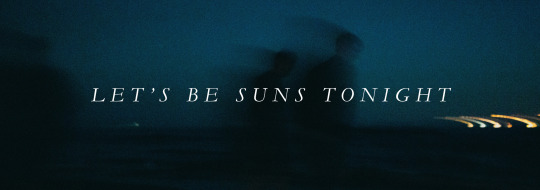
this is a gay vignette novel that i started writing back in 2021 as a source of personal joy. this is the story of how a singer-songwriter desperate for normalcy meets a boy with a heart heavy with guilt. this is the story of how they fall in love and it’s honestly quite wholesome <3
i haven’t worked on this book in so long and i’ve been trying to sneak some words in, but it feels like the book needs a fresh start. i don’t know, i just might start it all over again. but until then, here’s an outdated wip intro.
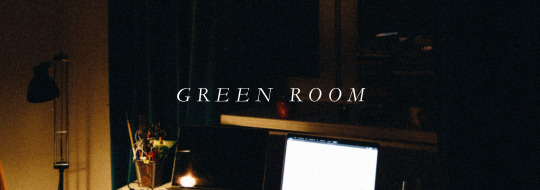
green room is a literary/experimental memoir documenting my teenage years as a writer. it is a deep dive into craft and how it affects life, particularly how it moulds you as a person. i haven’t started drafting this yet, but here’s a wip intro for now.
so, that’s about it!
if you’d like to be pinged when i drop a new publication or a wip update, just send me an ask to be added to my general taglist and i’ll tag you in those posts.
thank you so much for reading. i hope writing has been going well for you. if not, here’s some strength, some kindness, and some caffeine to keep going!
– love, ann.
general taglist (ask to be added or removed)
@shaonsim @heartfullkings @vnsmiles @dallonwrites @wannabeauthorclive @sienna-writes @violetpeso @flip-phones @silassghost @ambidextrousarcher @zoe-louvre @writing-with-l @magic-is-something-we-create @femmeniism @frozenstillicide @wizardfromthesea @rose-bookblood @coffeeandcalligraphy @rodentwrites @saltwaterbells @snehithiye @at-thezenith @subtlefires
#writeblr reintro#writeblr reintroduction#writeblr intro#writeblr#writer on Tumblr#literary fiction writer#my wips#my writing projects#navigation page#aljwrites
66 notes
·
View notes
Text

[ … ] ❀ you’re not from around here , are you? i figured because you totally just missed { DIHAAN 'DORIAN' VAKIL } walking by. don’t tell me you don’t know who { HE } is ? they kind of look like { DEV PATEL } and i could be wrong but i think that they might be { THIRTY } years old right now. they’ve been living in palmview for the last { TWO YEARS }. and i don’t know if anyone has ever told them this before but they kind of remind me of { MR. DARCY } from { PRIDE AND PREJUDICE }. if you stick around the town long enough you might catch them in action working as an { AUTHOR }. you see this town isn’t really that big of a place, some folks like to call them the { TORTURED ARTIST } of palmview! they took a liking to the name too after a while, go figure. oh crap, they must have heard me yapping. they’re coming this way. i got to warn you though, rumor has it they can pretty { SKITTISH } at times. i wouldn’t take it too seriously though, from the times i’ve spoken to them they seemed pretty { COMPASSIONATE } to me. we see each other all the time since they live in that { 1 BEDROOM } apartment beside me over in { OCEAN'S EDGE }. i better leave you to it. it was nice meeting you!
tw: mental illness, abuse
Basic Information
Full Name: dihaan vakil
Nickname(s): dorian, doe, dee
Age: thirty
Date of Birth: october 8
Hometown: sankod, india
Current Location: palmview grove, florida
Gender: cismale
Pronouns: he/him
Orientation: biromantic, bisexual (closeted)
Relationship Status: single
Occupation: author
Favourites
Weather: snow
Colour: baby blue
Sport: football (british)
Beverage: red wine
Food: shrimp scampi
Animal: horse
Family
Sibling(s): none
Pet(s): none
Biography
{tw: mental illness, abuse} to say that things haven't been very easy for dihaan would be an understatement. his father struggled with severe schizophrenic and bipolar behaviours, believing that dihaan was the reincarnation of the devil. as such, he kept the young boy locked away in the attic. occasionally, his mother would slip him books or newspapers to read, things he could easily hide if his father came looking for him. at first, he was only allowed to leave the home to attend temple, but soon, the townspeople started to get suspicious of this young boy, who didn't attend public schooling, and began asking questions. spooked, his father's delusions deepened, and leaving the house became an impossible task. he became the primary victim of his father's mood swings, enduring treatment he would never dare speak of again.
while his father had intended to keep him locked up forever, dihaan's mother knew that she needed to get him out as soon as possible. on dihaan's eighteenth birthday, his mother packed him a small suitcase of whatever they could spare and put him on a bus to the nearest big city. there, he got a job washing dishes and used the cash he made to rent a room. the dishwashing job turned into a line cook job which earned him enough money to get his affairs in order and disappear to america. new york, specifically, where his favourite novel had taken place. a land of new beginnings.
{tw: abuse} new york was where he met maria. maria was a vibrant woman, who consumed his life almost immediately. she helped him reinvent himself. at first, she supported his dreams of becoming a writer and publishing his first novel. he'd gotten another restaurant job in the big apple, but she encouraged him to quit it and work on his writing. she would support him. that turned out to be the biggest mistake he ever made in life. the ensuing emotional, physical, and financial abuse crushed the already-weakened dorian, who really only dreamed of somewhere to belong.
however, dorian had made a friend (future WC). this friend helped him escape, giving him a place to live while he got his feet back under him. even introduced him to a publisher, who after reading a snippet of his writing, offered dorian a deal. he would act as a ghost writer, writing everything from celebrity biographies to finishing the work of authors who'd passed on. it was unfulfilling, but it paid the bills. and then, he got a promotion. to romance novels. under a pseudonym, dorian wrote sappy, steamy, romantic harlequin novels. they weren't best sellers, and none of them would ever win literary awards, but he realized he had found his niche. these novels gave him an escape from the real world, where he was unloveable and broken. when his friend moved back to their hometown of palmview, dorian decided to come with, figuring this was as nice a town as any to settle down in.
8 notes
·
View notes
Text
Jade S. Sasser has been studying reproductive choices in the context of climate change for a quarter century. Her 2018 book, Infertile Ground, explored how population growth in the Global South has been misguidedly framed as a crisis—a perspective that Sasser argues had its roots in long-standing racial stereotypes about sexuality and promiscuity.
But during the Covid-19 pandemic, Sasser, an environmental scientist who teaches at UC Riverside, started asking different questions, this time about reproductive choices in the Global North. In an era in which the planet is getting hotter by the day, she wondered, is it morally, ethically or practically sound to bring children into the world? And do such factors as climate anxiety, race, and socioeconomic status shape who decides to have kids and who doesn’t?
The result is her latest book, Climate Anxiety and the Kid Question, published last month by the University of California Press, which centers on a range of issues that are part of a broader conversation among those who try to practice climate-conscious decisionmaking.
From the outset, Sasser cautions that her work does not attempt to draw any conclusions about what the future might hold or how concerns about global warming might affect population growth going forward.
“This book is not predictive,” Sasser said in a recent interview with Inside Climate News. “It’s too soon to be able to say, ‘OK, these are going to be the trends. These people are not going to have children, or are going to have fewer children or this many, that many.’ We’re at the beginning of witnessing what could be a significant trend.”
Sasser said that one of the most compelling findings of her research was how survey results showed that women of color were the demographic cohort that reported that they were most likely to have at least one child fewer than what they actually want because of climate change. “No other group in that survey responded that way,” Sasser said.
Those survey results, Sasser said, underscores the prevalence of climate anxiety among communities of color. A Yale study published last year found that Hispanic Americans were five times as likely to experience feelings of climate change anxiety when compared to their white counterparts; Black Americans were twice as likely to have those feelings.
“There is a really large assumption that we don’t experience climate anxiety,” said Sasser, who is African American. “And we do. How could we not? We experience most of the climate impacts first and worst. And the few surveys that have been done around people of color and climate emotions showed that Black and Latinx people feel more worry and more concerned about climate change than other groups.”
Sasser, who also produced a seven-episode podcast as part of the project, said that she hopes her work can help fill what she sees as a void in the public’s awareness of climate anxiety in communities of color.
“Every single thing I was reading just didn’t include us in the discussion at all,” Sasser said. “I found myself in conversations with people who were not people of color and they were saying, ‘Well, I think people of color are just more resilient and don’t feel climate anxiety. And this doesn’t factor into their reproductive lives.’ That’s just simply not true. But how would we know that without the research to tell us? But now I’ve started down that road, and I really, really hope that other researchers will take up the mantle and continue studying these questions in the context of race in the future.”
Sasser recently sat down with Inside Climate News to talk about the book and how she uses her research to show how climate emotions land hardest on marginalized groups, people of color, and low-income groups. This interview has been edited for clarity and length.
14 notes
·
View notes
Text










Here; (is the only place) (2025) 2 x 10.5” (closed), 16.5 x 10.5” (fully open), 1.375 x 16.5” (pop-out accordion segment) 16 page accordion-fold book (+23 page pop-out accordion). Risograph-printed, ink and coloured pencil illustrations and poetry.
Here; (is the only place) features riso-printed ink illustrations and poems. The book connects childhood grief with climate grief through their shared experience of losing home and being swept into a future that threatens unbelonging. Depending on how the book is held, the openings cut into the pages become doorways to frame the past (pages) or only empty space— regardless, something has disappeared.
---
My last crit at ECU was for this piece!! im graduating this May my god it still hasn't really sunken in yet
I got a lot of positive feedback for this work and my live reading of it and the colours turned out even better than I could’ve hoped :']
I’ve applied to a few zine fairs including VABF, so hopefully I’ll be able to sell these there! Otherwise I’ll look into maybe an online store or smth like that (spooky but exciting)
Oughh I don't know about new favourite (There Are Good Things Yet To Bury still pops off to me lol) BUT I think it's definitely been one of my favs to work on!! in terms of process n all that C: BECAUSE!! I got to try out my new dip pens and finally use those acrylic inks (that i got in 1st year cause they were on the class materials list and then we never fuckin used em. rip but hey now here we are full circle) and do some traditional illustration!!! New territory for me and it was really fun!!
I usually stick with digital illustration for all my finished illustration work (vs my traditional sketchbook is only rlly for studies or sketches/thumbnails) but oughhh my god this might change me. this might do it LOL
Maquettes / Ideation phase
I knew I wanted to do more cool stuff with windows after TAGTYTB + at the time I recently had a dream about my childhood home again. It's something I noticed a long time ago, and all poetic metaphor aside I do literally just. only really dream about my childhood house lol, or rather do sometimes dream of other imaginary places but I NEVER dream of the current house I live in (maybe like 1-2 times that I can remember in the 8+ years I've been living here). I also wanted to do a long skinny accordion fold guy. No particular reason than it was an idea that kept sticking to me lol; + I hadn't done anything with accordion fold+windows and AH there's so much potential there because of how every single page overlaps each other with that folding method!!!
So! That was the basis for my concept, and I started to fold n scribble on scrap paper to make these maquettes. I also started numbering them which was SO helpful thank god because I think I ended up with TWENTY OR MORE maquettes by the end wagh!! But oh my god these were so helpful to make so many of I really hit on something with this one below, 1 big rectangle and 2 circle windows... It wasn't even intentional, I just cut them into the paper and then started drawing/writing, and once I reached the flipside realized that you could see the words "this is my home" on one page, above the drawing of the house which was on ANOTHER page. WHAT!! literally so cool I'm so happy that happened it literally dazzled me:

Midterm / printed maquettes aka poem writing in affinity publisher
In my final crit, one of my profs asked if 'this is what I saw in my head the whole time' in a 'wow I can't believe it looks this good congrats' kind of way LOL which is like so oof but so fair because this is what my midterm presentation looked like LMAO:

I have a LOT of analysis-type notes I wrote down in my google doc so I can remember in the future all my intentions with the poems and its a pretty LONG list. One of the main ones is how the semicolon ; operates as the symbol of being inbetween a continuation, barrier, threshold, stop, doorway... ALSO it kinda looks like a lock+door handle (!!)
Also this might've been before my midterm, but I went back to my childhood home area and ough. I'm glad I did cause I got inspiration for the illustration imagery when I saw how big the trees had gotten. I literally said out loud "oh!" aough my god. I don't know I just hadn't expected it... I think I had even noticed it a few years ago when I visited but forgot and I just. augh. Included the experience in one of the poems in this book "I looked for my grief / I looked / for disappointment [...] and still i was / startled / by the / bigness of the / trees [...] it's just such a relief / to know that something grew / up with me"

ILLUSTRATION TIME BABEY
this whole process was FULL of stress but like GOOD stress. I was on my fuckin grind dude All my text/poems/windows layout was all formatted in affinity publisher, and then I printed that out (at staples, I was gonna use the library but they couldn't print tabloid size paper rip) and just pencil sketched right on those. I COULD NOT HAVE DONE THIS DIGITALLY I DON'T THINK. Because it involved cutting out the windows so I could PHYSICALLY take the paper and see where the images would line up on other side. which was fun as hell

Then I took to staples again and made photocopies (so I didn't fuck up the original pencil sketch), and then traced the tabloid size + windows onto my nice paper. Also look at my setup !! We have this glass table in my house, and I had the kickass idea to put a bright light underneath as a DIY lightbox yippee!! It is however a very low table and while I had a lil stool it prob wasn't great for my back or legs lol (sidenote why are lightboxes so expensive its just a box with a light in it man)



inking time! dip pens ouh my goodness... Still trying to get used to them but they give such nice results.. I'm surprised at how much I like how the illustrations turned out tbh but I am really enjoying this kind of weaving, vignette/snapshot/overlapping almost collagey kind of vibe it has, especially with the text. Similar to the poems I also have a list of all my illustration symbolism/analysis kind of thoughts. it's a shorter list, but one of the main things on there is how I kinda in the moment ended up creating these visual rhymes: The door hinge = rollerskate wheels = moth (plucked wing) = pine cone scale; representing how things follow you from past to present in different forms, things changing but into what? I did separate layers for lines and colour, main book and pop-out accordion. The colours were fun because the acrylic inks came with a dropper and I'd drip bits of ink from real high up to get a lovely splatter !! and also used a straw to blow wet ink around all around a good time I used a sheet of plastic to protect the paper with the lineart on it from the wet ink/water going onto the colours layer. The lightbox was good but defo less effective with the colours layer because the water would warp the paper and lift it away from the table surface (so I couldn't see the lines below rip) Oh my gosh and I used pencil crayons for more texture!! forgot about that lol but it really really helped, and I did some frottage of my childhood house's key+traced its outline; I really wanted the key to be as "real"/"connected to reality" as possible (+yes once again that is a truth in the poems, I do still have it because before it was sold someone broke in and completely destroyed the door handle/lock. we assume with a crowbar.)


also my cat would sit behind me on the couch while I worked sweet creature... (ouh and I know there's Himi Gouache in that one image but I didn't use gouache lol I was considering it but didn't) I worked on the illustration every day of reading week from morning to night to get it done in time for risograph printing hoowheeee


Scanning and Prepping for Risograph Printing
I scanned my lineart and colours with my school's fancy scanner (which I'm gonna miss once i graduate augh it scans soo nicely staples scanners dont do shit for detailed scans)
I knew how to do it in photoshop already, but Managed to figure out how to split my colours so I had files for just blue, just yellow, etc. Ended up with SO MANY FILES!! i love you risograph printer even if I had to prep and print 16 files and redo 2 masters lol

I checked how all the colours looked digitally but you really can't exactly predict how risograph will look until you print it, and I was trying to extrapolate and imagine how the prints would look based on these digital mockups lol.
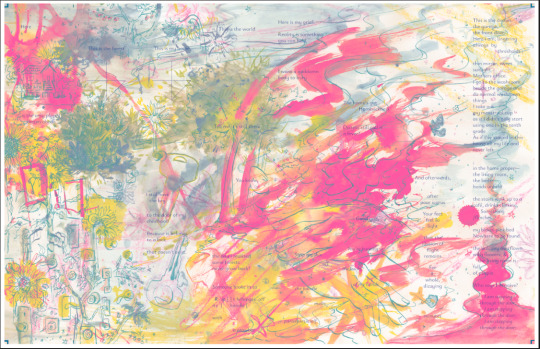
Lucky for me, they actually turned out BETTER and brighter than I was imagining!! Except for pop-out accordion side A, which looked wayy too busy and forest-green for my liking lol. So I had to redo the master and ended up doing NO blue colours, only blue lines which I think turned out ooo yummy tasty speaking of redoing masters, I also had to re-do the teal in the main book too because it was WAY darker than I was expecting and making the text too hard to read waaagh but I'm so very glad I fixed it because it made a world of difference in legibility. In total ended having to buy 4 new masters to redo orz
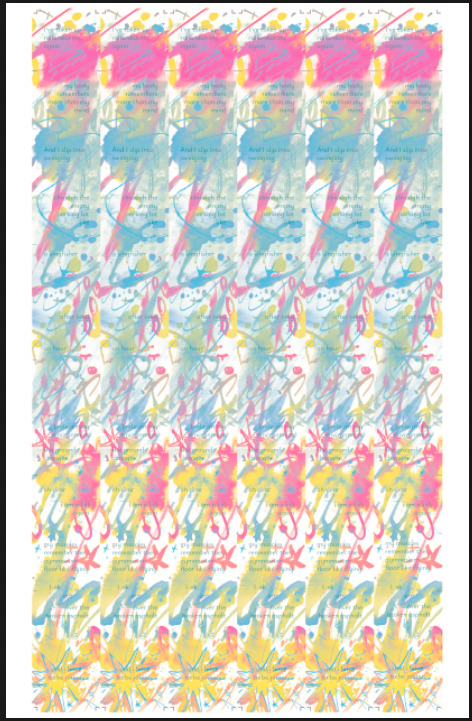



Trimming folding binding
This was kinda irritating lol .. I didn't realize I guess the stack cutter in the comd studio cuts at a bit of an angle or smth cause the size was slightly smaller than I wanted. which is a problem because I need my windows and folds to line up as precisely as possible and the slight size difference kinda fucked that up :(( but ah well. it doesn't get super in the way of experiencing the work but I'm a little miffed lol I also had to score and trim all the pop-out accordions one by one waghhhh Look at this pile orz

I'm SO glad I scored all the fold lines for these though that was so smart of me thank god because I could not have folded them without those guides holy shit it would've gotten so misaligned. AND it made it soooo satisfying to fold along a score line, like with the gentlest pressure it folds perfectly right where you need ouh chefs kiss cutting the windows is tedious sigh but!! I'm very happy with the circle cutter I bought just for this project (and for future window cutting in future projects ofc). I actually bought 2 circle cutters but the first kinda fuckin sucked when I tested it out rip. You can't see where you're cutting and it's fine for Cutting A Circle but not for when you need to cut a circle in a SPECIFIC spot like I do lol. Olfa Compass Circle Cutter for the win babey (not sponsored. is that even a thing on tumblr posts. lol) also when you grab a handful of the folded pop-out accordions it makes me feel like I'm grabbin a bunch o fun caterpillars C:

Final crit!
I was really strugling with figuring out where or how to install this thing, but thankfully my profs had booked a space that once I took a look (I'd never been in that room before lol there's still so many rooms I probably don't even know exist at ECU) ended up working really well ! I borrowed a blanket/tablecloth from my supervisor at my workplace when I was talking about my project and wanting to find a fitting tablecloth, and the pic they showed me of it was p much perfect very colourful !! yaaay thank goodness I was able to haul a plinth over to the room and set it up by the window C: natural light and near the rooftop garden, very good! And set up a bunch o chairs so people could sit while I did my reading.

The reading went very well!! I actually lol its soo funny I had practiced a bit at home and had always held the book out to my right, but on the day of I held the book to my left n as I started reading realized "oh no. unexpected flip I can't see some of the words as good" LOL but once I got to the pop-out accordion I kinda had an excuse to switch to holding it out to my right haha and it went smooth The class really liked my performance and the work overall which I'm awaughhh :'] like TAGTYTB people were really into the "choreography/architecture" of the windows, as one person described which is SUCH a good word for it o my goodness
And 5 people bought a copy!!!!!! oh my god!! tbh I thought maybe 1 or 2 ppl might but 5!! I'm not particularly close with any of them either, I'd consider like 2-3 I'm more familiar with but even then oh my gosh. awaa ;;w;; was so so lovely and gave me a lot of confidence in the piece I printed 100 copies! don't know if i should print more or not seeing as it was so successful... my energy is pretty spent now and I wanna take a while to recover lol now that the semester is winding down. But I'm gonna lose studio access to the comd risograph printer soon so i dunno... ah sigh
Now the grad show is my next big thing. my application is submitted and the due dates gone n passed, but this crit gave me the confidence n idea to do a reading of the book(s) I'm showing...... I sent an email if there's any way I could add some kind of scheduled event to my application but idk it's been a week since the due date so it might be too late to make changes rip
other fun stuff
It's now in the ECU artist book collection!!! I was so spooked by it but my profs recommended I look into it and the process was way easier and the person I emailed had the vibe like they did this all the time lol???
🎶 Music I was listening to while writing the poems to try and catch the vibes I needed:
Virgina - Boys Go To Jupiter
Claw Machine - Sloppy Jane ft. Phoebe Bridgers
Death Throes Of A Struggling Romance - (formerly Maryknoll)
Copacabana - Harvard Dn & Tonics acapella with Soloists Elio Kennedy-Yoon and Andrew Courtney
No More Birthdays - Sophie May
Anthems For A Seventeen Year-Old Girl - yeule
wish u were here - Boys Go To Jupiter
Lovers Always Lose - Boys Go To Jupiter
Ankles - Lucy Dacus
+like the whole Meet Me After Practice album - Boys Go To Jupiter LOL i love it soooooo fuckin much
4 notes
·
View notes
Note
Hi, it’s been a long time since I’ve been in the Avatar fandom and I was trying to get my friend into them! I remembered you being one of my fav blogs since you wrote Chiaroscuro. Long story short— has there ever been some kind of lore masterposts for Avatar? I can find bajillions of Ghost lore posts but I’m having trouble finding anything for Avatar or at the very least for the Avatar Country era. Thank you for basically being a pillar in the fandom for so many years!
Hi, welcome back to Avatar Country!
First of all ... a pillar in the fandom?!?!? I am SHOOK with the honor, thank YOU for those kind words!!! I am but a humble servant to our king and his royal circle, I live to serve. (And by serve, I mean reblog everything Avatar-related so that my obsession can be everyone's problem...)
As for your question ... I'm thinking the reason you aren't finding anything is because there isn't anything out there. Unlike Ghost, Avatar isn't really a lore-based or lore-focused band. Avatar Country was the closest they've ever come to having official lore, and really that was only for that specific era. Even Feathers and Flesh wasn't lore about the band -- it was a fable brought to life with music. At this point, they bring out the royal costuming when they perform AC songs at shows, but it's usually only for one (sometimes two) songs.
The only thing I can come up with to offer as "lore" would be Legend of Avatar Country: A Metal Odyssey, the movie (featuring the three videos that they also put out for the album's singles) that the boys made with the help of a Kickstarter campaign, and it's so much fun! (There are a few elements in the videos that inspired @girlwiththepapatattoo and I as we developed our vision of the Chiaroscuro version of Avatar Country, but since the movie came out after most of our beast was written, it almost felt like WE inspired THEM.) It's available on Youtube and I'm pretty sure it's also available on avatarcountry.com. Speaking of avatarcountry.com, that's a great place to check out the boys' behind-the-scenes stuff, the play-throughs with Tim and Kungen, and little clips of them being the ridiculous dorks I love and adore. It's not lore in the traditional sense, but the history of the band and how Avatar has evolved over the years is just as fantastically rich as anything they could have invented. If you aren't already a part of it, you can join in at any time (I THINK you can set up a free account by filling out a "tourist visa" that lets you check out everything on the site, but don't quote me on that. Otherwise, becoming a citizen costs about $30.)
OH, almost forgot! There is The Making of Avatar Country, the book that they wrote/published through the Kickstarter campaign, available to purchase on avatarcountry.com. It. Is. FABULOUS. The photography alone makes it worth the cost. Again, not lore in the traditional sense, but seeing how Avatar Country was brought to life is *chef's kiss*. 10000/10 highly recommend.
And (shameless plug alert), you know, you can always re-read the beast in all its many parts ... lore abounds there. =)
youtube
Hey, look at that, I babbled once again and wrote a small novel instead of a normal-size response. *ahem* Hope this helped, and thanks so much for the ask! Always here for more asks if you have them ... as you can see, I love talking about my favorite Swedes!
#i love getting asks!!!!#i also don't know how to act normal about them#but YAY asks!#also ... a pillar of the fandom#that just made me blush and cry#to think that anyone considers me as such... just wow#i'm humbled and honored#avatar band#avatar country#johannes eckerström#henrik sandelin#jonas kungen jarlsby#john alfredsson#tim ohrström#beautiful swedish men#chiaroscuro#chiaroscuro: aura#chiaroscuro: umbra#chiaroscuro: aurora#chiaroscuro: lustre#chiaroscuro: illuminare#our fanfic#our writing#oh how i miss those glorious thursdays#when we would post and scream and cry over everyone reading our wild beast and loving it#good times#thursdays were best days
16 notes
·
View notes
Note
can i ask how long have you been writing? it blows my mind how good it is. you are very gifted and we’re all so lucky to get to read your works for free and i really hope you publish something big one day
also do you have any tips for new writers? i’ve been writing intermittently for some time but i still find it so hard not to compare myself and get bummed out or discouraged when there’s writing like yours out there 💔
Ps: I’m loving all the snippets of everything you’ve posted. keep up!
Oh, probably forever? I mean, I was making up stories before I could write and made small books by hand before I could type and I remember using my grandfather's clunky old laptop to painstakingly write my first "real" stories after I started school.
I started writing in English when I was probably 12-13 years old though and I'm 30 now so it's been a while. I posted some stuff on Quizilla back in the day (which oddly wasn't fanfic, but original stories), and I posted my first story on FFN when I was around 20 years old I think?
I go through periods of time where I write a lot and then I don't write at all for a while, mostly because real life gets in the way or something drains my creative energy. Like I couldn't write more than one sentence at a time the first year after I had my baby. Not because I didn't have time, but because the baby took all my focus and I did not have anything leftover to be creative.
Anyway, I think my best tip for new writers is just to write a lot. Like allow yourself to practice, to be bad, to experiment, to learn - just like you would any other hobby, you know? I have posted more than 1 million words on AO3, but I probably have more than twice that much that I'm never going to post that's just collecting dust in my dropbox. And that's fine! It's just practice!
Right now, I'm trying to re-learn how to write in my own language again (Norwegian) because it sounds awkward and weird to my ears and that is probably because I haven't written in Norwegian since I left high school - I need to practice.
Also, be careful comparing your first draft with someone else's finished product. I don't spend too much time editing my fanfics (because it takes the fun out of it and I never make progress), but even I re-read my writing a few times and change phrasings here and there to make it flow better. I personally like to read everything out loud (making funny voices during dialogue) to catch if it flows how I want it to flow.
Another tip is to read a lot. Preferably published books, but fanfiction too. I'm a bit weird here because I can't read fanfiction for the fandom I'm writing for and that is just because I know I will start to compare myself to others and be discouraged, just like you mentioned. Both when it comes to writing style and level of engagement. I mean, some fics have 1000s of notes or kudos/comments and I start wondering how bad my writing is because it doesn't get the same response. At one point, I almost wished someone would post a bad review of my story because it would have felt better than the complete radio silence I received. Truth is, I think engagement is mostly related to coincidence. Summaries, tags and format matters, of course, but after that it's just down to luck. If you're lucky, your story will find its readers and if you're especially lucky, those readers will let you know that they liked it :)
I'm wary of reading nothing but fanfiction though because we fanfic writers tend to get influenced by each other and use a lot of the same expressions, I think. There's a reason I never have characters smirk, chuckle or hum anymore because I'm still traumatized by how much I used that when I started writing. It's bad enough with how much eyebrow quirking and raising I manage to add in a single story. Also when it comes to characterizations, I try to stay true to the source material, but it's easy to mistake fanon for canon when you read too much of the same stuff.
Sorry, this got super long. I'm just sorry to hear that you're discouraged, especially because I am the exact same way when it comes to comparing myself to others. We are our own worst critics, but I highly encourage you to keep writing! I cringe when I look back at my first stories, but I would never have improved if I hadn't written those stories in the first place :)
#asks#writeblr#writing meta#on writing#ao3 writer#fanfic writing#ao3#this was a lovely question to receive#as well as a heartbreaking one because it's like I wrote it myself#i still feel this way at times#but i'm fortunate enough that i have stories out there that some people absolutely love#and that helps me combat the imposter syndrome#i save all my favorite comments and reviews and go back to them when i need a reminder#i also pester my discord buddy for compliments and she always deliver#:)
7 notes
·
View notes
Text
the romance novels i’ve been reading for the past few days are adequately suited to my sensibilities for me to keep reading them but they are really not good unfortunately. they’re by an author nicola davidson, and they reflect some of my deeply held values around the importance of sexual freedom and the personally liberatory nature of getting off.
i appreciate how the author takes sexual needs seriously, and not just in the “when it’s not the forever love the sex is bad, when it’s the forever love the sex is perfect” way but in portraying sexual miscommunication as an obstacle to emotional connection. in one book, a married couple almost splits because, after a perfect femdom/malesub first sexual encounter, she tries to be the perfect demure wife and he experiences this as a rejection and reveal of fundamental incompatibility. in two books, a submissive bisexual man marries a woman he’s intensely compatible with but can’t connect with her sexually until they have another man in the room to tell him what to do. i like these plots.
there are characters who have sexual natures that are, if not the same as mine, similar enough to relate instead of bouncing off. mostly it really isn’t the same kinks, it’s that these sexual freedom and their individual sexual and kinky desires are really important to them and they deliberately prioritize them in how they live their lives. recently i’ve been both volunteering at a [sex/kink/porn related organization] and reading posts on r/pornaddiction and r/loveafterporn and it’s really brought into focus how much porn and kink are things that i really love and have been fascinated with since i was a tween and have had mostly positive experiences with. porn and kink are important to me. they’re part of my daily life. i want them to be the focus of my career in archiving in the future. i find them deeply pleasurable and affirming to engage with.
when i read these posts from people on r/loveafterporn from women who experience their boyfriends and husbands looking at porn as a profound and painful betrayal, that shit is like skeletor to me. the little joys of sexual feeling that light up my day and connect me with other people are evil and disgusting to these women. what i regard as freedom and autonomy they regard as cheating and deprivation of what is owed to a partner. what i regard as sovereignty of mind they regard as an unfortunate obstacle to control.
most romance novels do not espouse an explicitly anti-porn or anti-being capable of attraction to other people worldview. most of the romance novels i read are sexually explicit, so promoting sexual fantasy. all of them, as romance novels, are tools for fantasy, for fantasizing about someone other than your partner if you have a partner, for treading and retreading the mental ground of “special fun things i like to think about alone”. but usually they do portray sexual feeling as being, at least in the context of the perfect ideal romance, something to be awakened and fulfilled by and for a single perfect lover. genre romance is changing, there are more and more authors who write characters with long-held kinks, characters who masturbate, and even characters who entertain sexual attraction for people other than their endgame partners. but it’s still rare to see a character to whom engaging with sexuality is a life goal and philosophy.
so i appreciate these books for that but omg the pacing is really bad and the author brings in these tensions of repression and being held back by society and then instantly and anticlimactically punctures them. it’s like every book is a first draft skeleton that should get 100, 150 more pages for the characters to stew and pace and conceal their truths and jerk off and cry, but they just confess and move on as fast as logistically possible. i thought maybe the writing was getting better over the author’s years of publishing, but actually one of her more fleshed out books (the devil’s submission) that i read first was from 2017 and the really rushed-feeling books i’m reading right now (a rake his patron and their muse, and earl his valet and their wife) were published in 2022 and 2023. it’s amazing the kind of writing i will tolerate for a romance novel that affirms my values and sexual subjectivity.
6 notes
·
View notes
Text
My Thoughts on “Moods”
It’s been forever and a day since I’ve written a rambling post on a book. Here we go!
::Spoiler Alert::
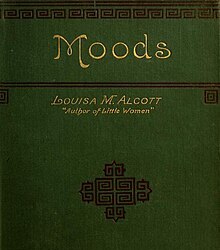
As you well know, I’m a huge fan of Louisa May Alcott. I’ve read many of her works, read the biographies on her, online articles, I’ve watched the American Masters docu-drama about her like a thousand times. I’m always eager for new bits of information regarding Alcott – like whenever new stories of hers are discovered. Those who are familiar with her life and works have probably heard about the first novel she published. No, not “Little Women.” Her first offical novel was called, “Moods” and it was published in 1864, four years before her best-known children’s classic. What was “Moods” and why haven’t we heard more about it?

Rather than writing “moral pap for the young,” Louisa May Alcott started out writing romances and “blood and thunder” tales. Gothic fiction, murder mysteries, thrillers…In 1860, she had an idea for new novel, and spent four weeks straight in what she called a writing “vortex.” She ate only when her family brought her meals, rarely slept, and didn’t stir often from her desk. Her world revolved around this novel and when she finally surfaced from her work, she was mentally and emotionally exhausted. She was uncertain of its quality; however, her family loved the book. She attempted to send “Moods” off for publication and there were editors interested in it, but only if she shortened it. Louisa put it away for a few years, only returning to it after publishing her acclaimed “Hospital Sketches.” Again, the editors wanted it shortened and she finally complied, believing it improved by the edits. Except for the ending, she wasn’t entirely pleased with that.
Three hundred dollars was her reward for her efforts. The payment helped her family immensely. The reviews were mixed though. One stinging review in particular stood out, authored by a certain Henry James (who later wrote “The Portrait of a Lady). He was especially insulting to it, and her in general, believing Louisa offered nothing fresh on the topic of which she wrote, but that there was no reason she couldn’t write a good book one day. The publisher rereleased the book again in 1872, following her “Little Women” fame, but it had been without her consent. When that publisher went bankrupt, Louisa got back her copyright and rewrote “Moods” yet again and published it as she wanted it. It was the book she just couldn’t let go. Despite what Henry James said, it had been inspired from life. The heroine was similar to Louisa in many respects, one character was based on Henry David Thoreau and another was based on Ralph Waldo Emerson – two men Louisa was known to have crushes on.

So, what was “Moods?” Was it any good? Or was Henry James justified in his criticisms of it? We can’t know what “Moods” was when Louisa wrote the first version of it. That draft has been lost. But when it was published for the first time, the public believed it was the story of a love triangle. However, in my uneducated mind, I believe it was meant to be a commentary on marriages and how they were not the “end all and be all” as it was once mentioned in the book. That was how I interpreted it anyway. Let’s begin with the heroine, who I would have rather seen remain single than end up married. I’m sure you can guess what happens in the course of the story.
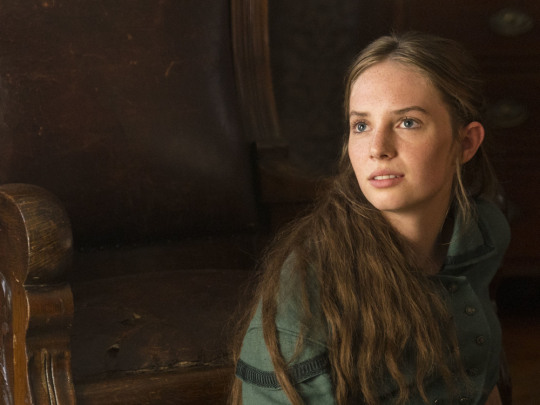
(Maya Hawke as Jo March in 2017. I think she’d do a fantastic job portraying Sylvia Yule, so I’m using her for this post.)
Before our beloved Jo March, there was tomboyish, moody Sylvia Yule who bucked convention by wearing boy’s clothes to work in the family garden, snuck into her neighbor’s library to borrow a book, who preferred to go on camping trips with her brother and his friends, to settling down and marrying. Yes, she is determined to never marry. It isn’t long before Sylvia notices one of her brother’s friends, the bold, blunt Adam Warwick, who matches her in temperament and principles. She falls in love with Adam and is distraught when he abruptly disappears. A misunderstanding follows, leading her to believe that he married another. Despite having refused her brother’s other friend, Geoffrey Moor’s offer of marriage, when he proposes again, she accepts. Sylvia is determined to be happy with her new husband and it does seem it will be a successful union…until she encounters Adam Warwick on their wedding trip.
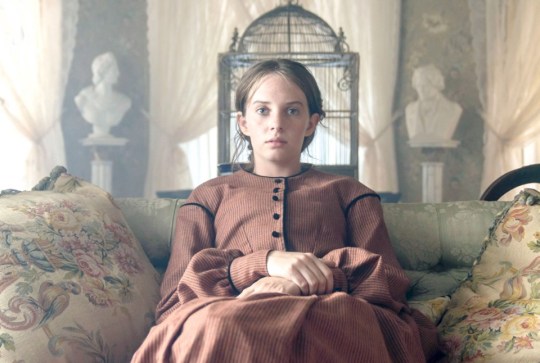
The truth is revealed – Adam isn’t married at all! He is free and wants to be with her, unaware that she is now a wife. They decide to keep their love a secret from Geoffrey, who is a good man and adores Sylvia, and who is a friend of Adam’s. Sylvia can’t handle living a lie and becomes convinced she must confess all to her husband. Deep down she wants to part ways, possibly even divorce. Geoffrey is brokenhearted when he hears this, but divorce is not an option. Not for him, not for her, not for the world they live in. He decides to go to Europe, to find some peace and maybe to one day come back if she wishes. As Sylvia sees him off, she is astonished to find that Adam will accompany him, in attempt to mend the friendship between him and Geoffrey. Sylvia later comes to the conclusion that marrying Adam wouldn’t be in her best interest as their marriage wouldn’t likely be successful. They were too alike; their union would be “uneven.” She summons Geoffrey back, to reconcile…the ship he is on sinks but his life is saved, thanks to Adam who gave his life for him. A broken-hearted Sylvia dies not long after Geoffrey’s return.

Though I loved “Moods,” there is one part of Henry James’s review I do agree with. He totally disliked Adam Warwick and I did too. For the life of me, I couldn’t see why Sylvia was in love Adam. Pedantic – I found him to be a pedantic jerk. But I guess there’s no accounting for first love. The other part of the story that I didn’t like was that Sylvia was killed off in the end. In the 1882 version, the ending was changed to Sylvia living and she and Geoffrey Moor continuing their marriage, which I feel was more of a realistic outcome for that era. I’m sure there were many couples who married and one or both spouses believed it was a mistake, but carried on I’m thinking of Newland and May Archer in “The Age of Innocence” by Edith Wharton. That was what they did in those days. Divorce existed, but not in polite society. Not for women anyway. Men could survive divorce, remarry, and there would be no judgment. Divorced women were scorned, shunned, and tended to “disappear” from that world. Ellen Olenska did as much in “The Age of Innocence.” That would have been an intriguing twist though – that Sylvia divorced Geoffrey Moor and had to deal with the 19th century repercussions of her actions.

All in all, I give “Moods” four out of five stars. I don’t think it was Louisa May Alcott’s best work – that honor goes to “Little Women” and “A Long Fatal Love Chase.” The writing was great – I just feel the editors had too much influence on the first version. Lousia May Alcott worked best on her own, she knew best how to craft a great novel. I’d really like to see an adaptation of “Moods” someday. The story may not have struck a chord with 19th century audiences, but I think it would be a success in the 21st century.
What about you? Have you ever read “Moods?” What were your thoughts?
4 notes
·
View notes